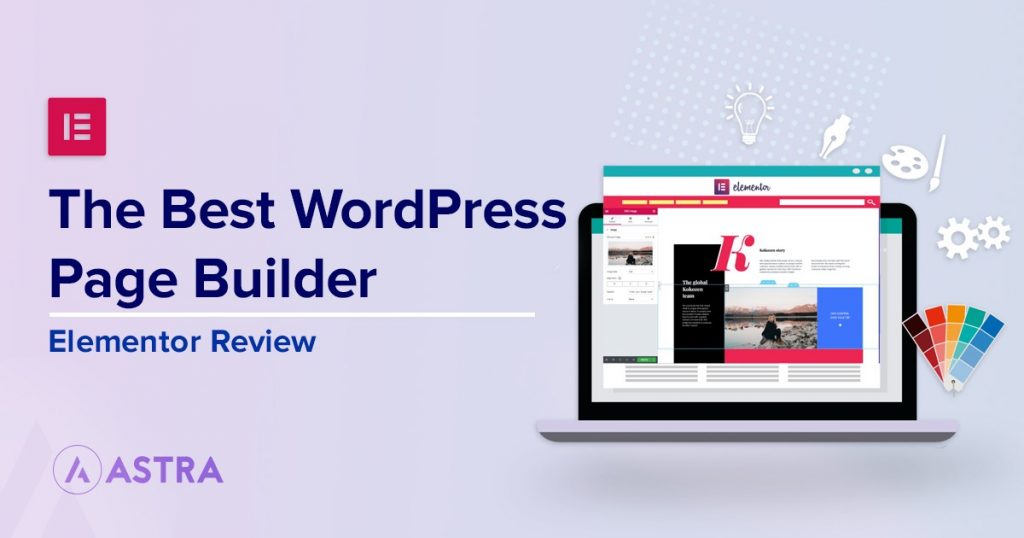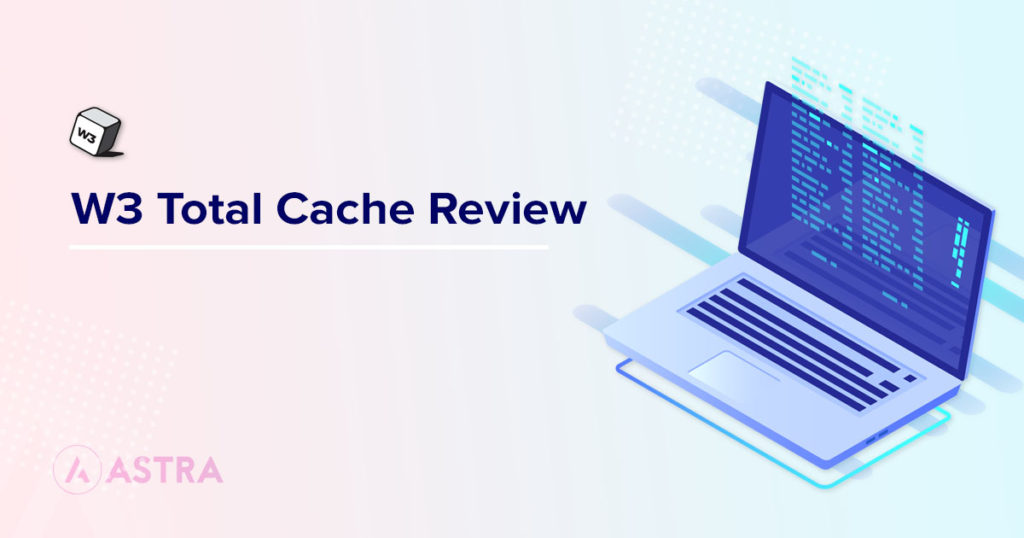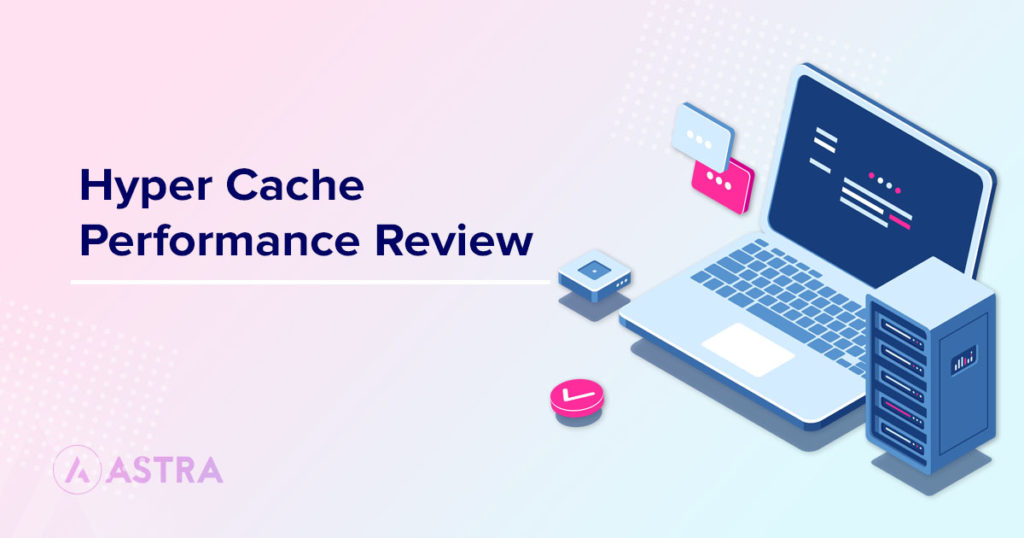LatePoint is a WordPress plugin to manage online booking and appointment scheduling.
If you want to know everything about the plugin, you’re in the right place as we’re confident this LatePoint review will help you make the right choice.
In this review, I’ll show you:
- The pros of LatePoint
- The cons of LatePoint
- Comparisons with competitors
- Whether or not I recommend it
Let’s jump right in and explore this appointment booking plugin!
By the way, if you’re a fan of videos, check out this LatePoint video review. It’s a great way to understand how the plugin works!
LatePoint Pros and Cons
Pros | Cons |
|---|---|
✅ A modern interface that’s easy to use and set up | ❌ Minimal design customization options |
✅ Adaptable to any type of business | ❌ Some changes require a manual page refresh |
✅ SMS and email reminders sent automatically | ❌ No Apple calendar support |
✅ Support for document sharing in live chat | |
✅ Supports multiple payment gateways | |
✅ High quality code and unbeatable customer support |
To start off our discussion, let’s check out what Alex Simov, a solopreneur and creator, has to say about LatePoint.
LatePoint Overview
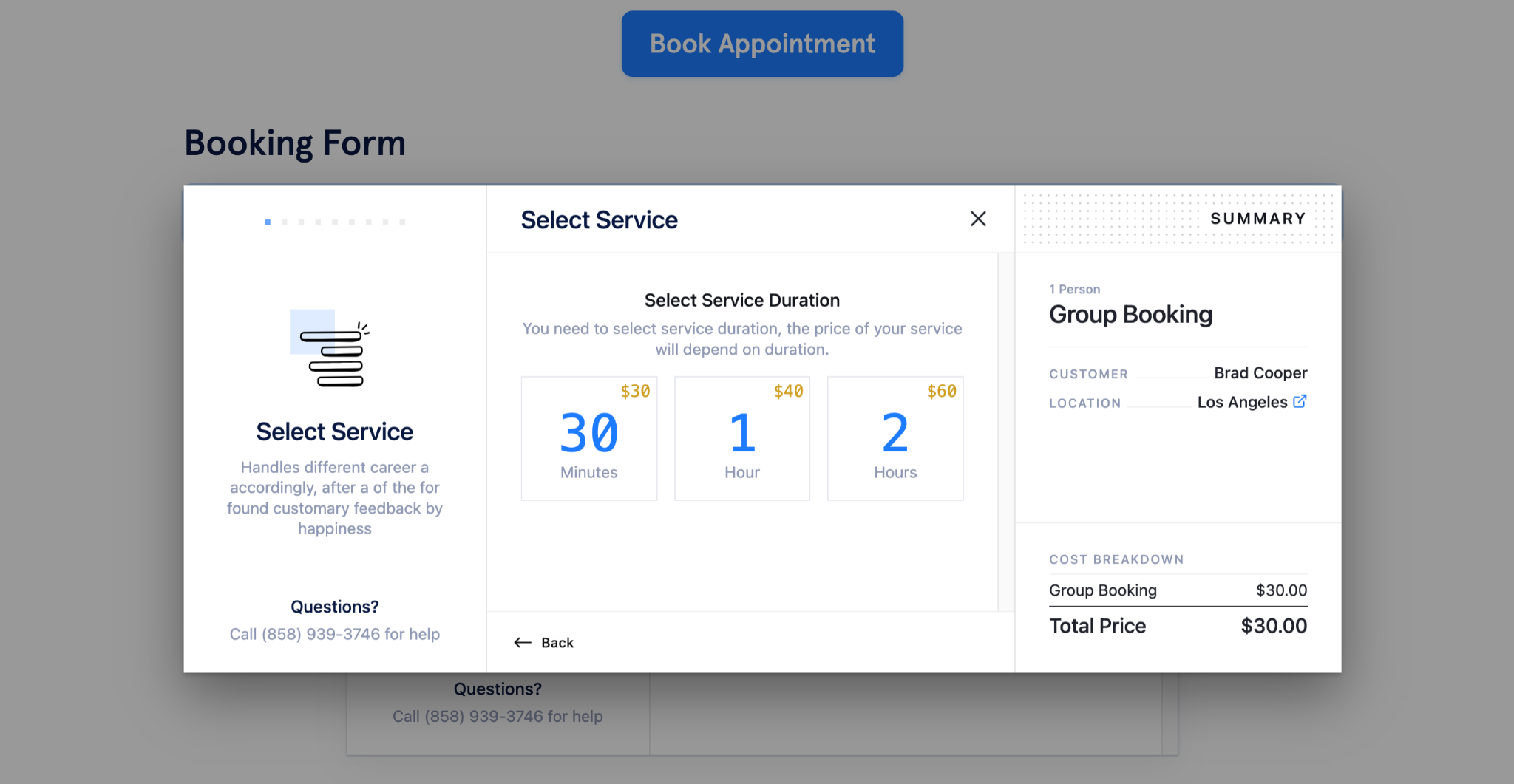
LatePoint suits a variety of booking-based businesses such as:
- Photographers and studios
- Gym and personal trainers
- Yoga instructors
- Web developers and agencies
- Coaches and consultants
- Educators
- Fitness coaches
- Doctors and healthcare practitioners
- Salons and beauty therapists
LatePoint is in use on more than 21,000 websites and that number is growing all the time!
No matter your field, this plugin strives to be your go-to booking solution. It simplifies the entire booking process for both you and your clients.
You can book appointments in 3 steps:
- Pick an agent
- Set an appointment
- Make payment or pay at the time
LatePoint allows you to manage appointments via a dedicated dashboard or chat directly with agents.
It’s also a breeze to integrate on your website. You can place the booking form anywhere you want on your website with a shortcode or utilize the booking block within the block editor.
LatePoint makes it easy to integrate Zoom and Google Meet, simplifying video meetings and widening the potential market.
It’s also simple to set up LatePoint on your website.
Here are the four steps:
- Install the plugin like usual
- Enable the features you need
- Add the booking form to relevant pages
- Let clients book appointments!
LatePoint Pricing
LatePoint has tailored pricing plans for single, five, and ten websites. No matter which plan you choose, you get up to 60% discount during the first year.
Let’s break down the plans:
- Basic plan: This option operates without any addons and suits individuals or teams with the most basic needs.
- Pro plan: This comprehensive plan packs in 26 addons, boosting LatePoint’s capabilities. They are a great fit for businesses seeking advanced features.
In case the Pro plan doesn’t quite match your specific needs, LatePoint’s sales team is available to craft a customized solution just for you.
LatePoint is so confident you’ll love the plugin, the company offers a 7-day sandbox trial. You can explore the plugin’s complete array of features on a working demo site before making a commitment.
Now, let’s take a look at the cost breakdown for each plan:
Basic | Pro | |
|---|---|---|
1 website | $49/yr renews at $64 | $89/yr renews at $116 |
5 websites | $170/yr renews at $319 | $310/yr renews at $579 |
10 websites | $290/yr renews at $637 | $530/yr renews at $1,157 |
Pro plans include all 26 add-ons | ||
If you’re on the basic plan but find yourself needing more advanced features, you can upgrade your plan anytime you need.
LatePoint vs Amelia vs Booknetic
To give our LatePoint review more context, let’s size it up against a couple of other leading players.
Here’s a fast feature comparison between LatePoint, Amelia, and Booknetic:
Feature Name | LatePoint | Amelia | Booknetic |
|---|---|---|---|
User interface | Modern, dedicated page and user-friendly | WordPress native interface and conventional style | Modern, dedicated and user-friendly |
Responsive design | Yes | Yes | Yes |
In-depth analytics | Yes | Yes | Yes |
Multiple locations | Yes | Yes | Yes |
Multiple payments | Yes | Yes | Yes |
Coupons/discounts | Yes | Yes | Yes |
Notifications | Email, SMS, Chat | Email, SMS, WhatsApp | SMS, Email, WhatsApp, Telegram |
Chat with customers | Yes | No | No |
Customer dashboard | Yes | Yes | Yes |
Calendar integration | Google, (Apple coming soon) | Google, Apple, Yahoo, Outlook | |
Video integration | Zoom, Google Meet | Zoom, Google Meet | Zoom |
Specific day schedule customization | Yes | Yes | No |
Recurring appointments | Coming soon | Yes | Yes |
Off days | Yes | Yes | Yes |
Waiting list | Coming soon | No | Yes |
Exportable data | Yes | No | Yes |
Booking form customization | Limited | Yes | Yes |
Webhooks | Yes | Yes | Yes |
Group bookings | Yes | Yes | Yes |
Multiple payment methods | Yes | Yes | Yes |
Custom fields | Yes | Yes | Yes |
Social media login | Yes | Yes | Yes |
Booking flow customization | Yes | Yes | Yes |
User role management | Yes | Yes | Yes |
LatePoint Key Features
LatePoint comes loaded with an impressive lineup of features that cater to businesses of all kinds.
Let’s dive into what LatePoint has up its sleeve:
Key Features
✅ Intuitive frontend and backend | ✅ Powerful service and agent management module |
|---|---|
✅ Mobile friendly design | ✅ Multiple location and time zone selection support |
✅ Well designed dashboard with detailed analytics | ✅ Stripe integration |
✅ Built-in calendar can sync with Google Calendar | ✅ Multiple payment gateway support |
✅ Downloadable appointment, customer and payment data | ✅ Supports custom fields |
✅ Zoom and Google Meet integration | ✅ Optimized for maximum performance |
✅ Group booking support | ✅ Social media login |
✅ Twilio integration for sending SMS | ✅ Supports automations |
✅ Webhooks available for 3rd party tools |
LatePoint Sneak Peek
We’re going all-in with our LatePoint review, delving deep into its features.
To make this happen, we’ll install the plugin on a fresh website dedicated to our pet grooming booking service.
Setting Up LatePoint
Before we explore LatePoint’s features in detail, let’s set it up.
Once you opt for the most suitable LatePoint plan, you will see a license in your user dashboard.
Go to your account area, find the download link, and save the zip file to your computer.
Copy the license key as you’ll need it in a little while. Then you’re all set to start!
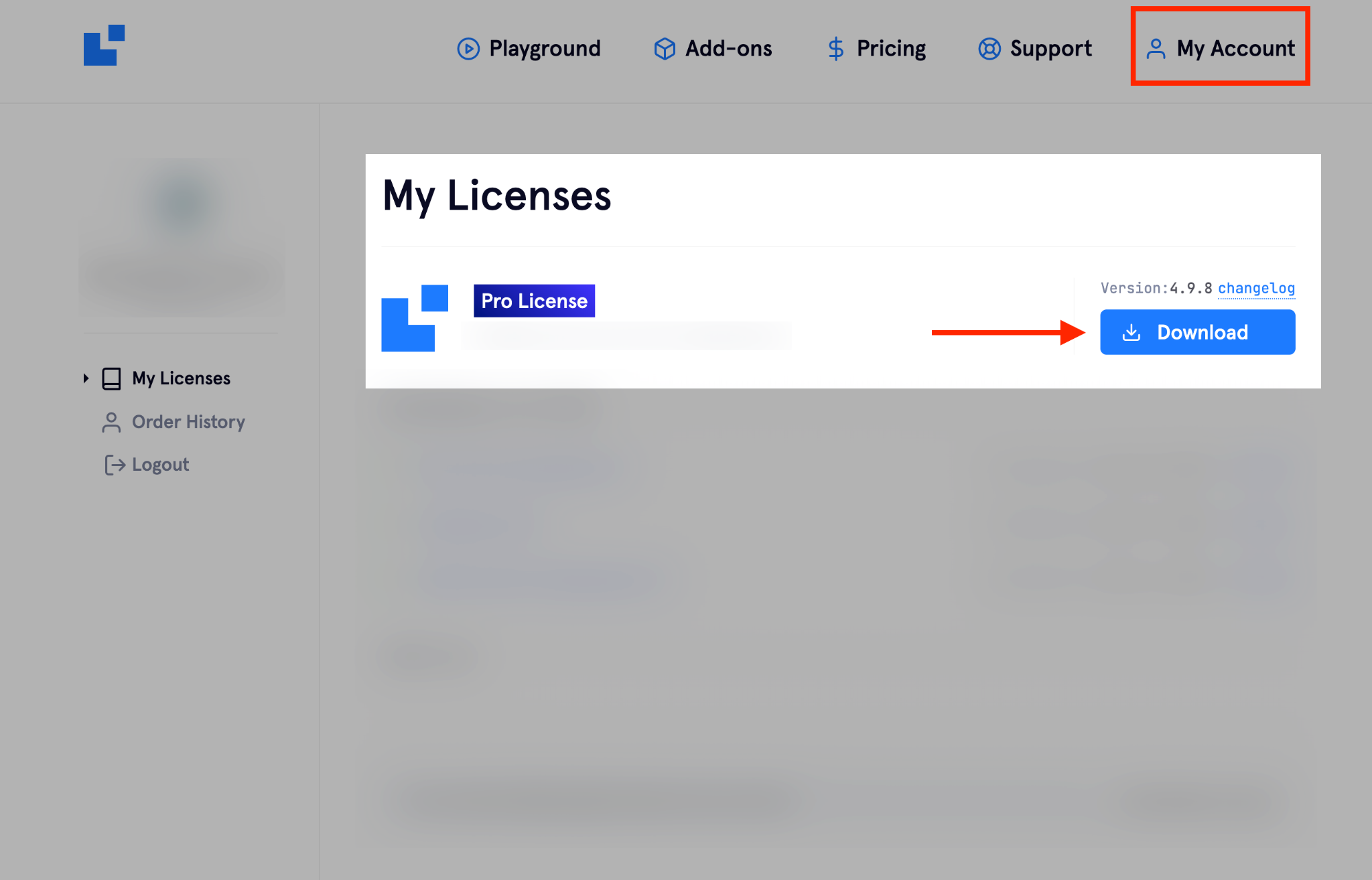
Installing LatePoint
Installing LatePoint is easy. Just follow these simple steps:
- Log into your WordPress website.
- Go to Plugins > Add New Plugin > Upload Plugin > Choose File.
- Select the LatePoint zip file you downloaded and upload it to WordPress.
- Click the Activate button to trigger the setup wizard.
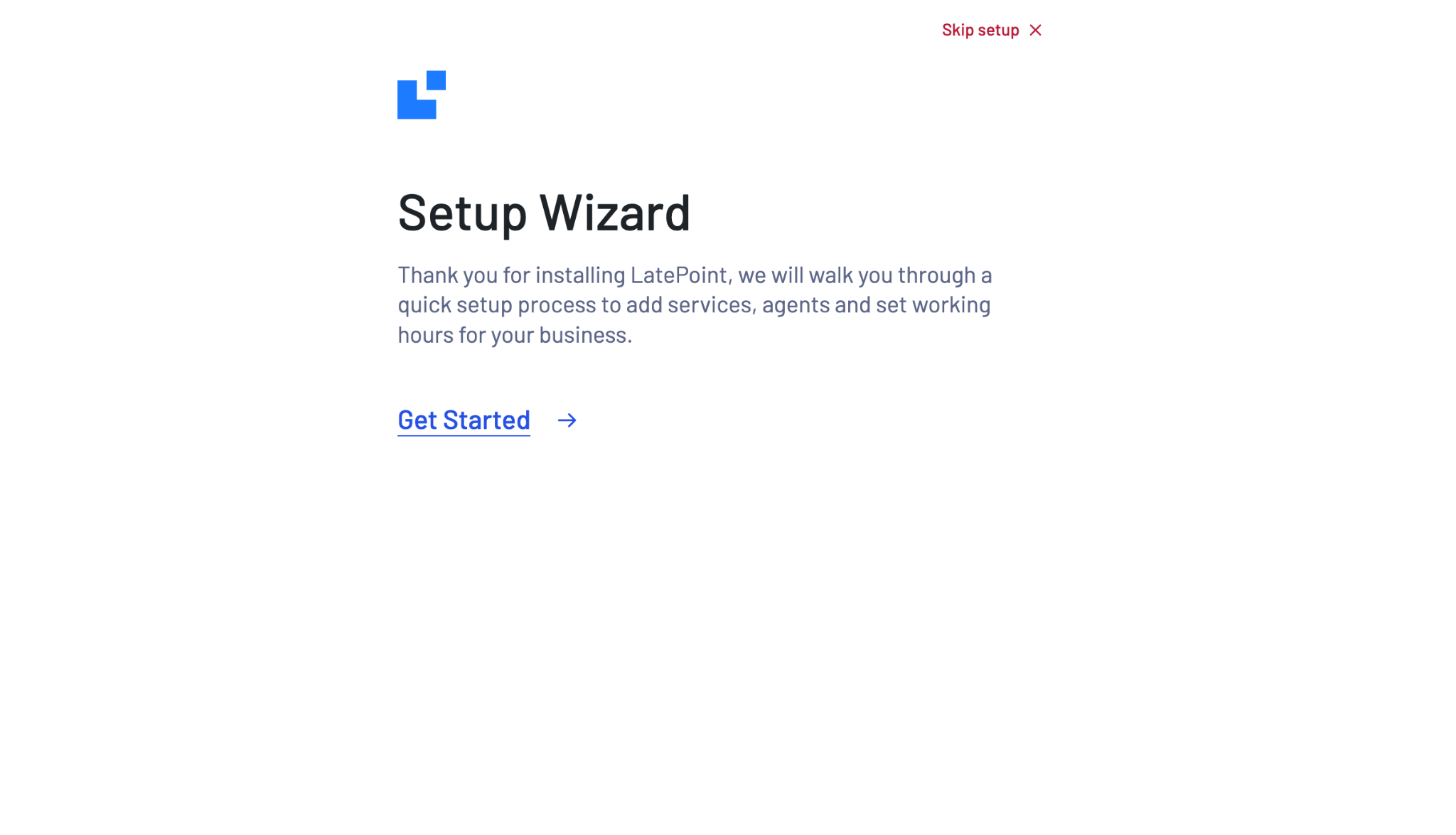
The wizard will guide you through adding your services, agents, and configuring your business hours.
You can skip the wizard at any time and configure everything later from the plugin’s settings page.
Adding Agents
The first step in the setup wizard is to add your agents. Agents are the people who can be booked for appointments such as consultants, doctors or hairdressers.
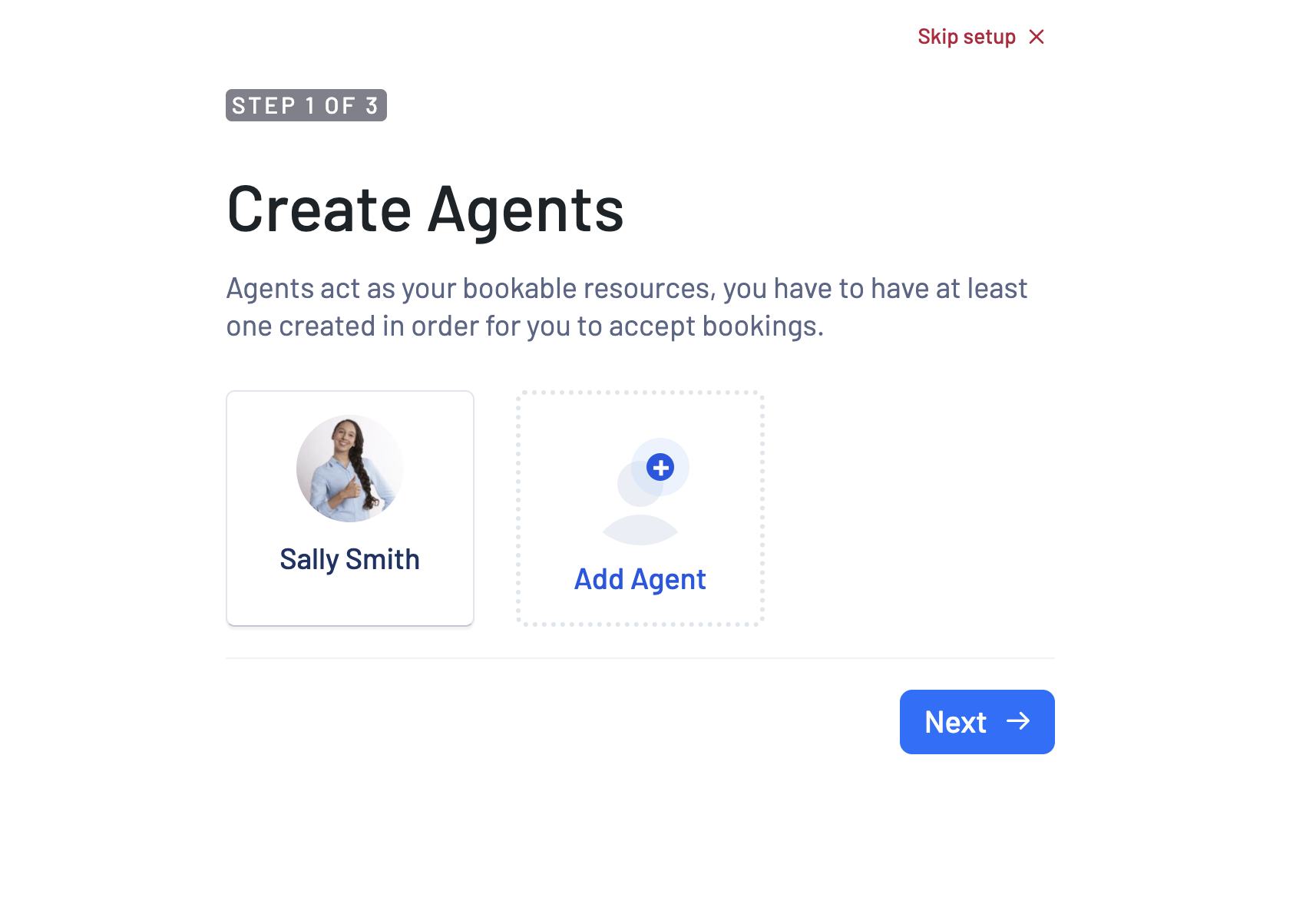
Enter the agent’s name and email address and click the Save button to save the agent.
You can add multiple agents if you need. Press the Add Agent button and repeat the process to add agents.
Once done, press the Next button to proceed.
Adding Services
The next step in the setup wizard is to add your services.
Enter a descriptive service name, session duration and upload a relevant image. You can assign an agent to this service too while you’re there, or do it later.
Click the Save button when you’re done.
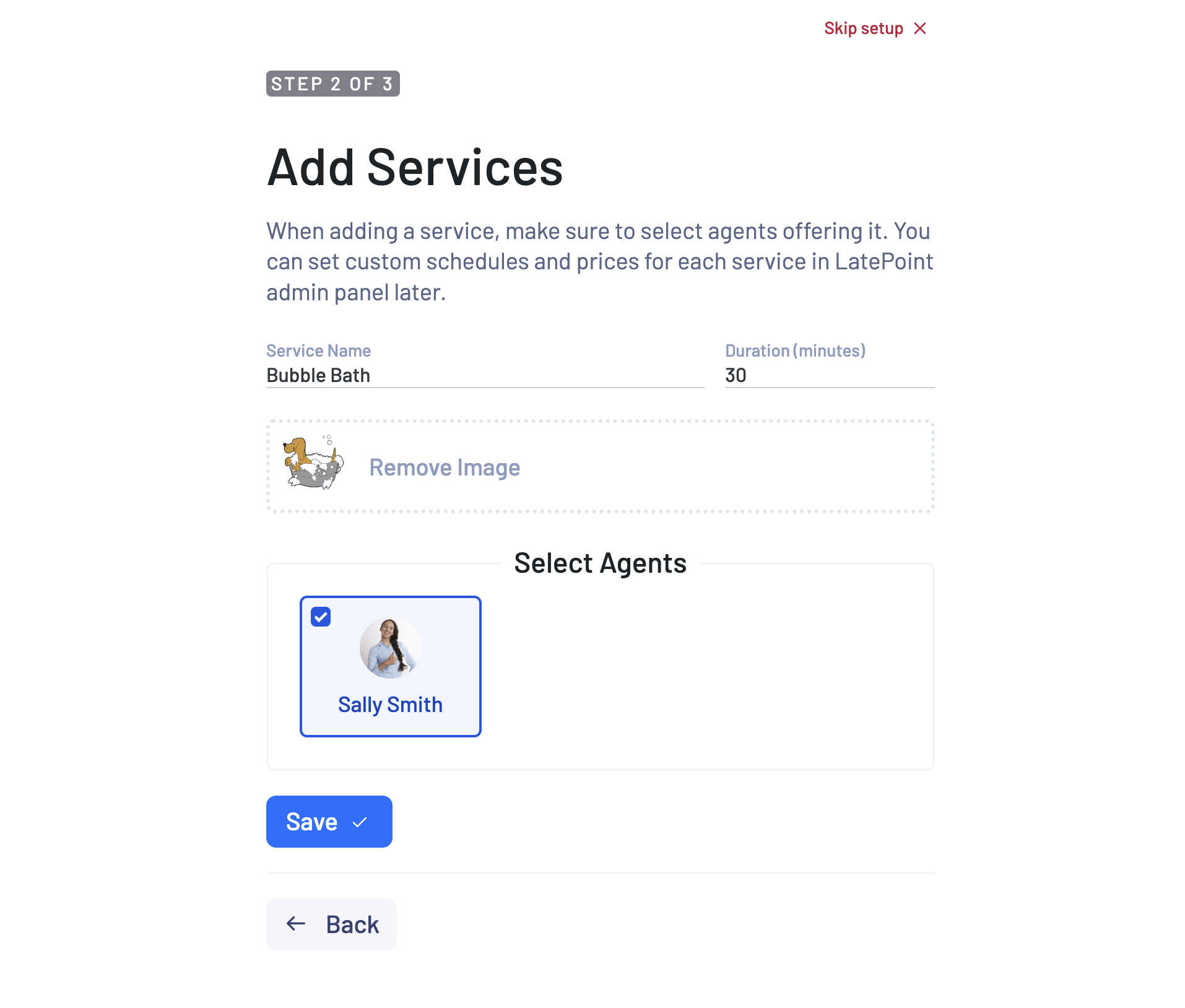
You can repeat these steps as many times as you need to add all the services you offer.
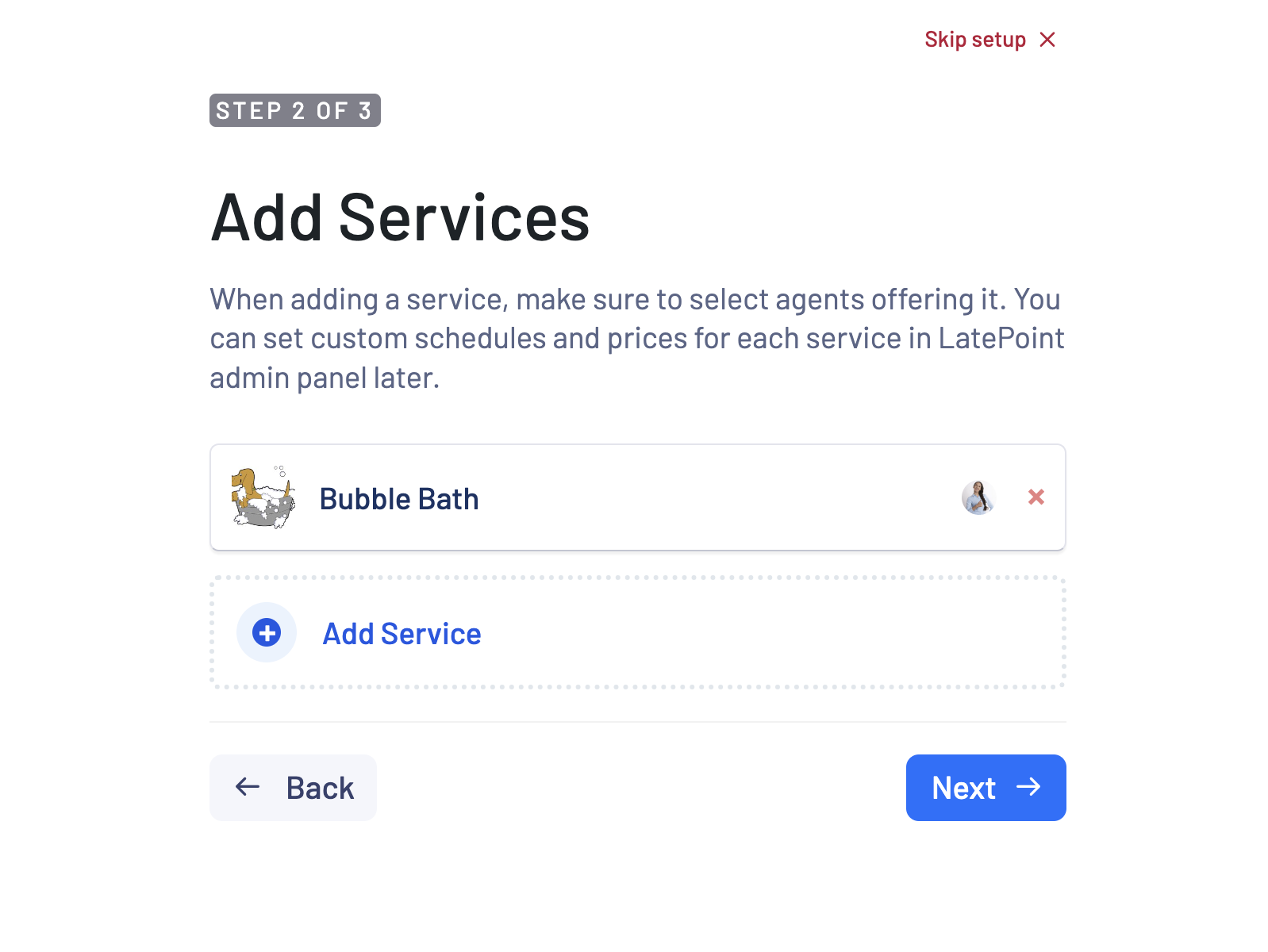
If you ever need to correct information, use the Back button to go to the previous screen.
Setting Work Hours
The last step in the setup wizard is to set your work hours. The setup wizard helps you with a preselected weekly schedule for your business.
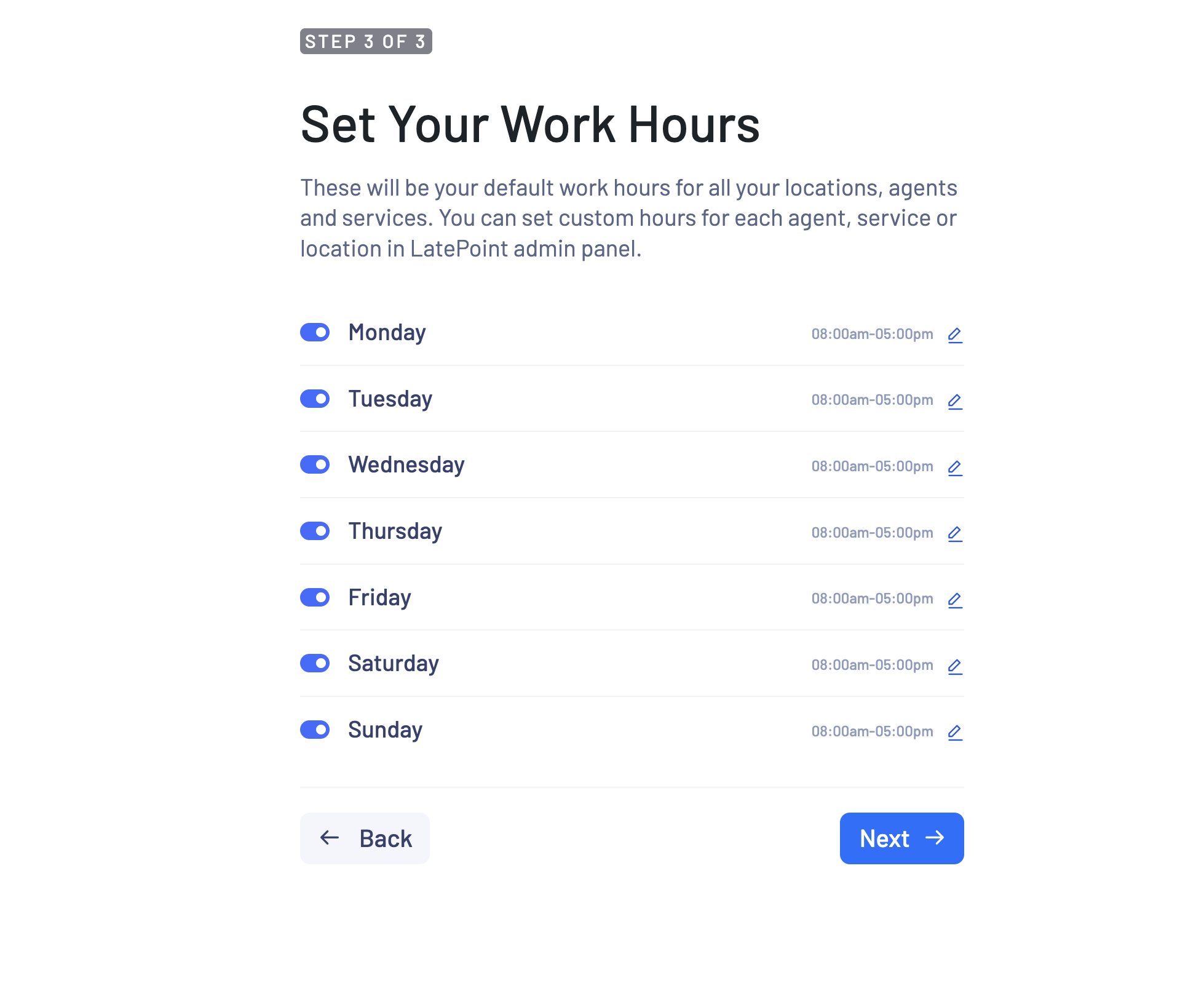
You can edit the entire schedule however you want. For instance, if you need to adjust the timing for a specific day, press the edit icon to do so. You can also use the toggle keys to set your on/off days.
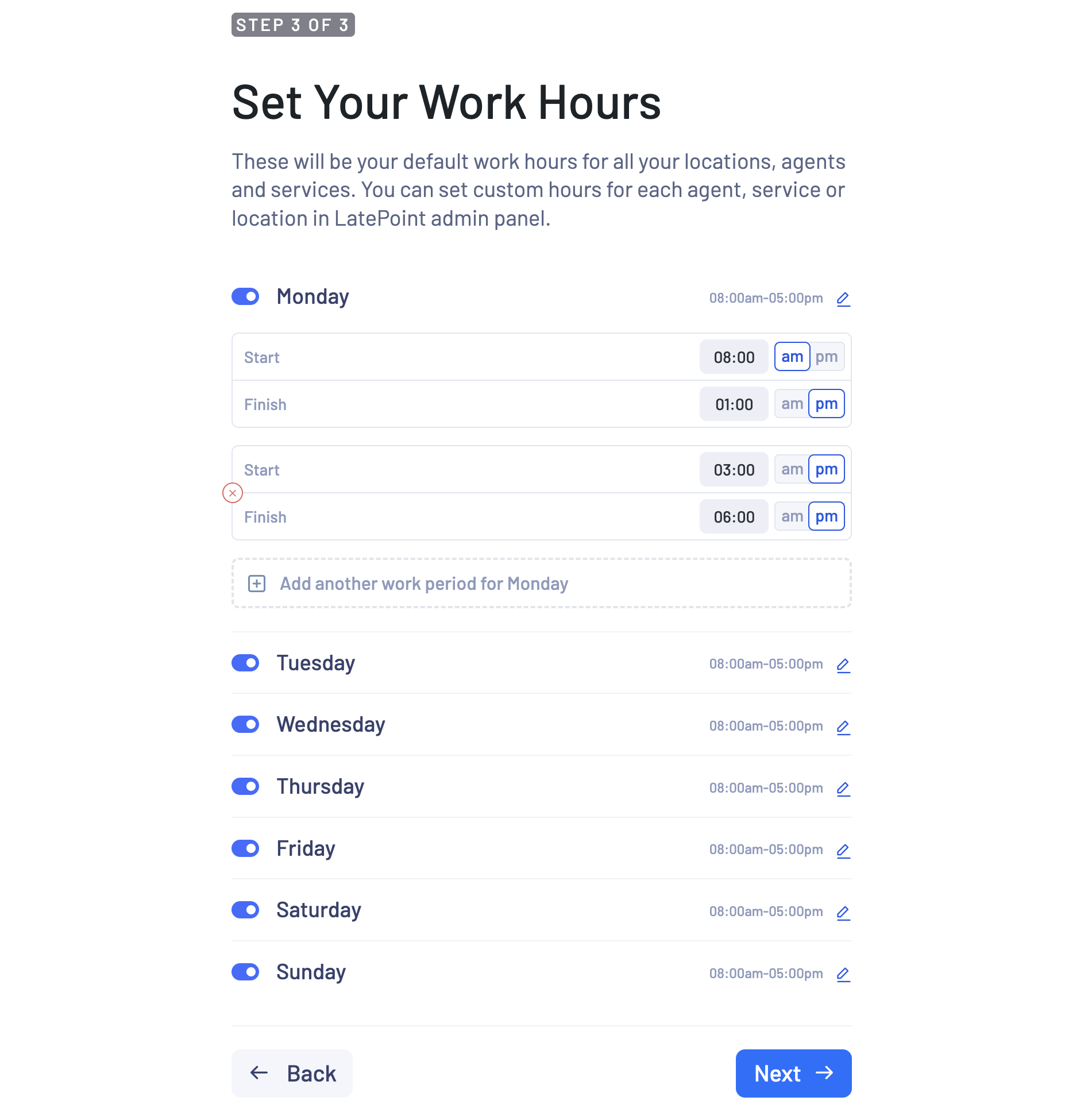
Click the Next button to save your work hours and proceed. This setup wizard is only a glimpse of a powerful and flexible settings area that LatePoint offers.
Once you finish setting up LatePoint, the wizard creates a shortcode. This code lets you place the booking button anywhere on your site.
If you prefer, you can achieve the same result by using the button block in the page editor.
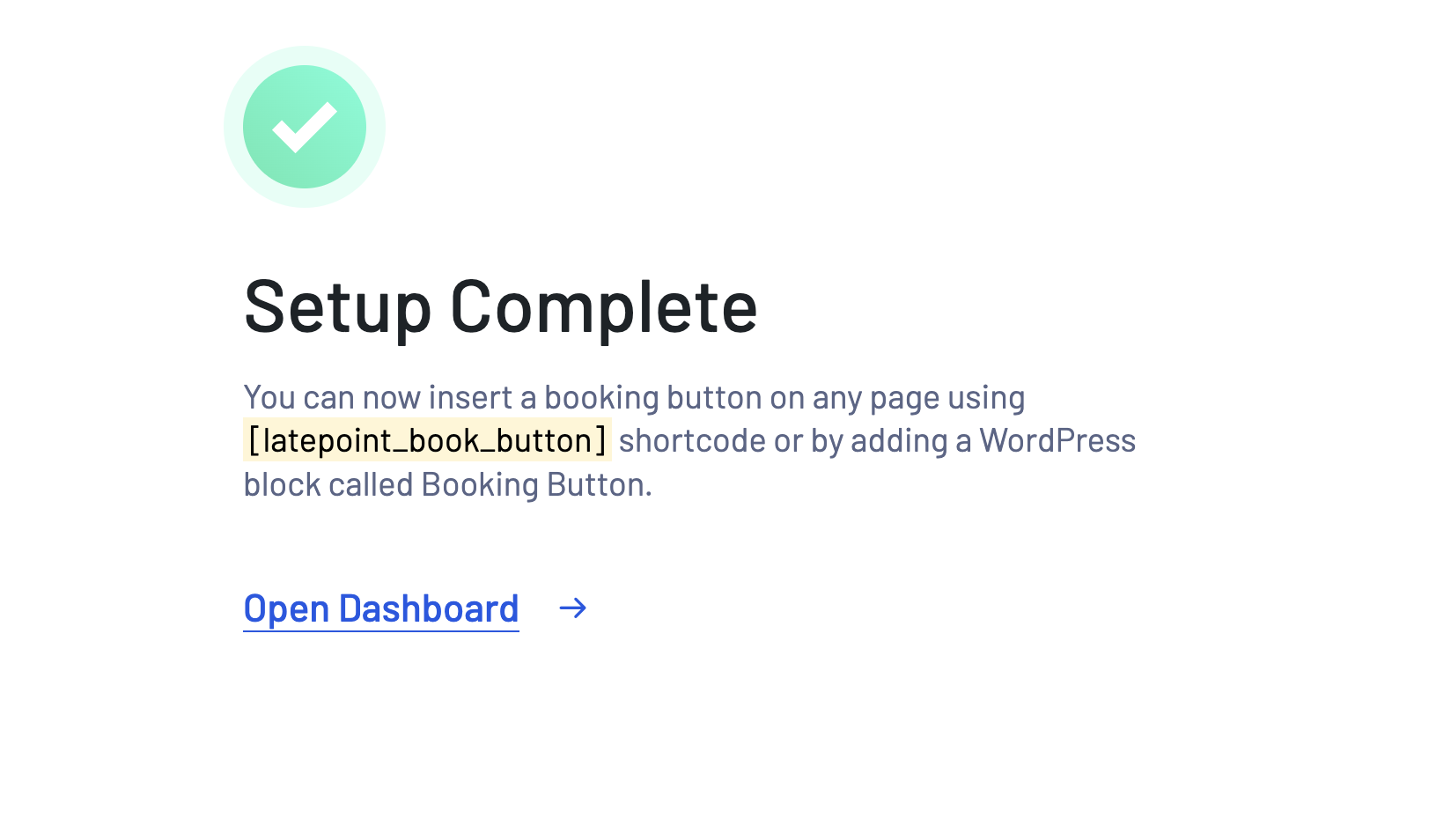
On the last screen, click the Open Dashboard button to access the LatePoint dashboard.
The dashboard is where you manage appointments, agents, services, and settings.
LatePoint Dashboard
The LatePoint dashboard is your hub for all things related to bookings.
It’s split into two parts: a menu on the left and a panel on the right, where the data from the left menu shows up.
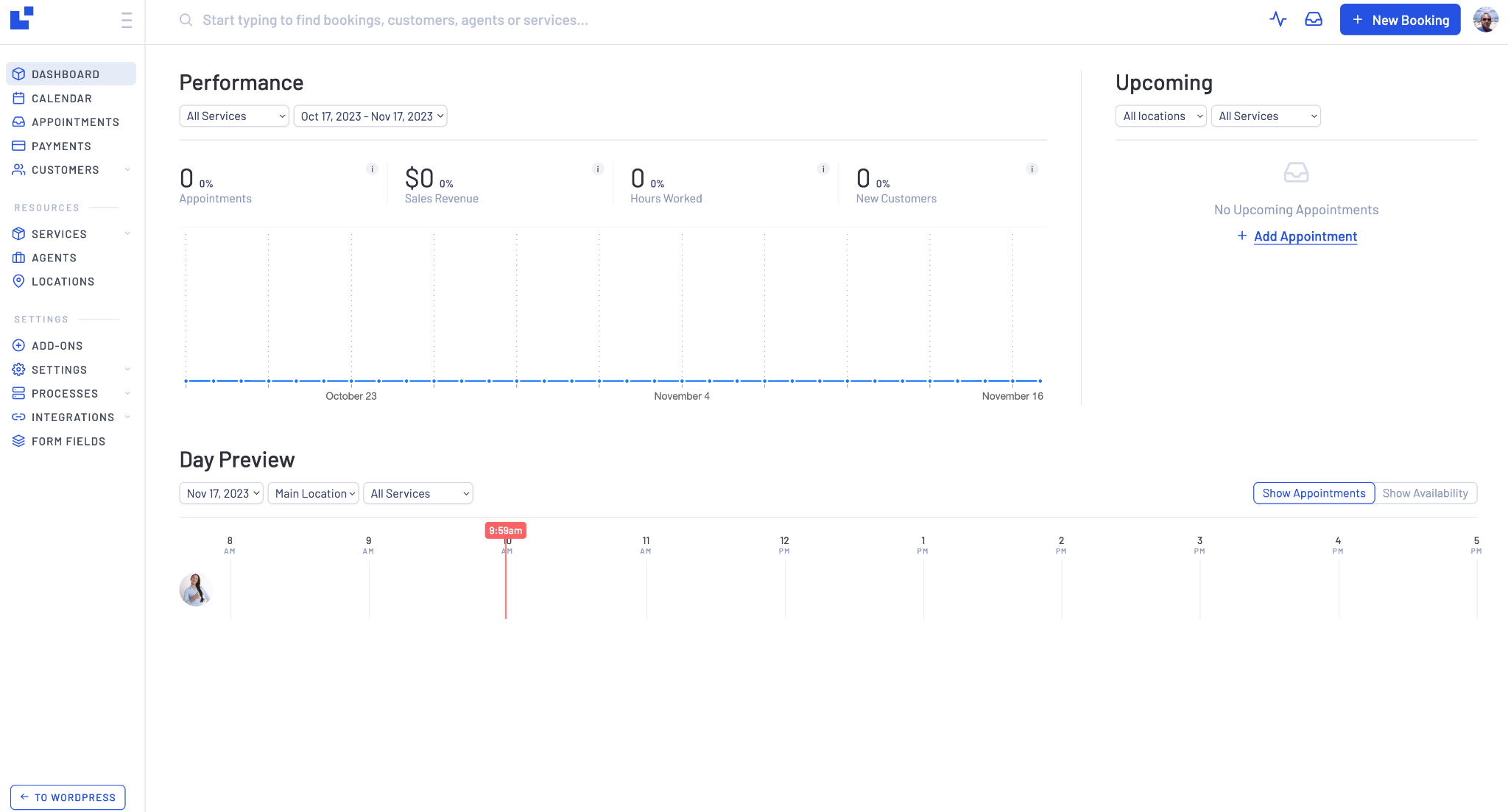
There’s a neat hamburger menu at the top of the left sidebar. Clicking this collapses the sidebar, giving you more space to view the data.
To bring the sidebar back, just tap that same hamburger icon.
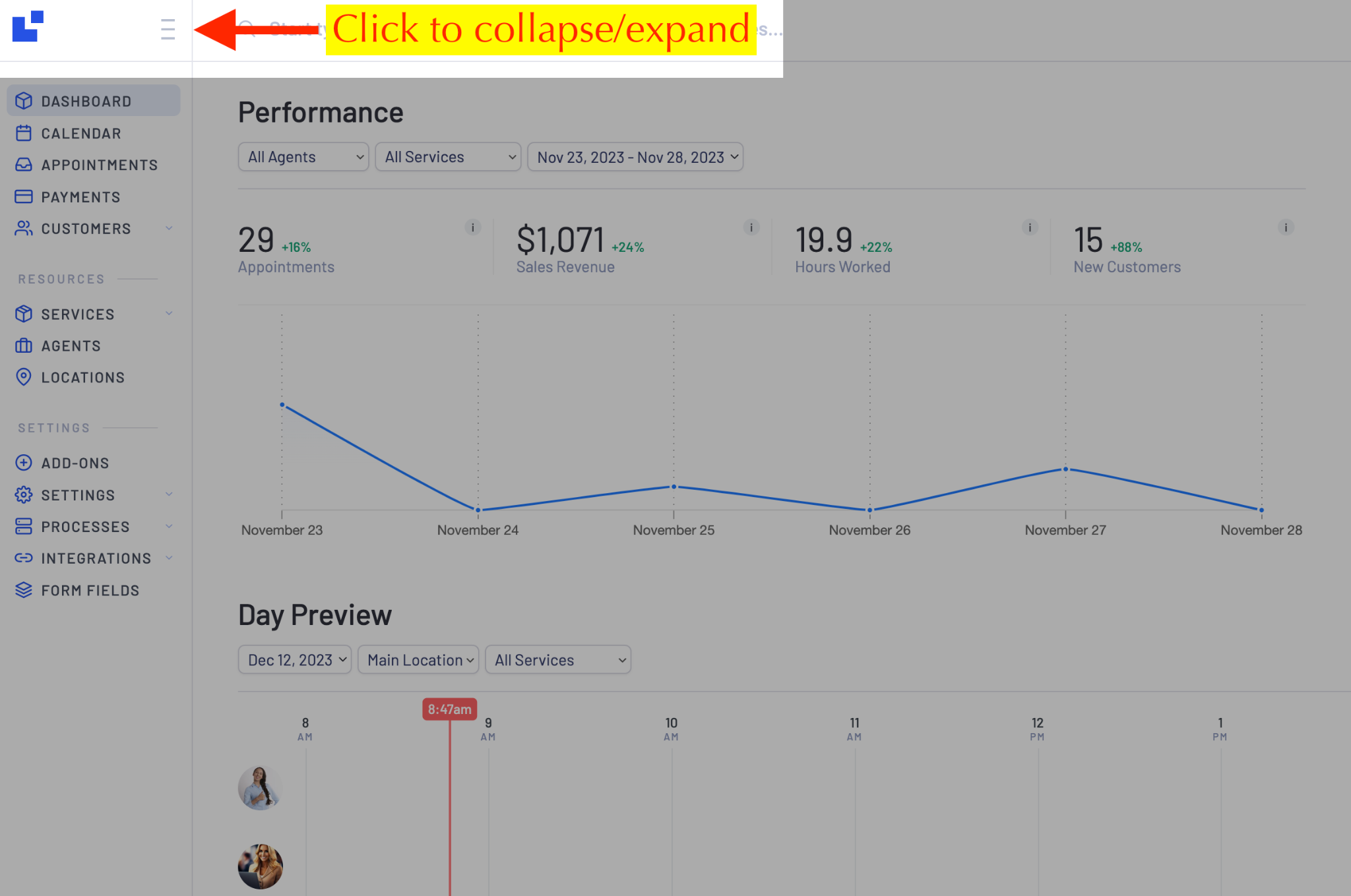
LatePoint’s interface takes over the usual WordPress admin area, but you can easily return by clicking the TO WORDPRESS button at the bottom left.
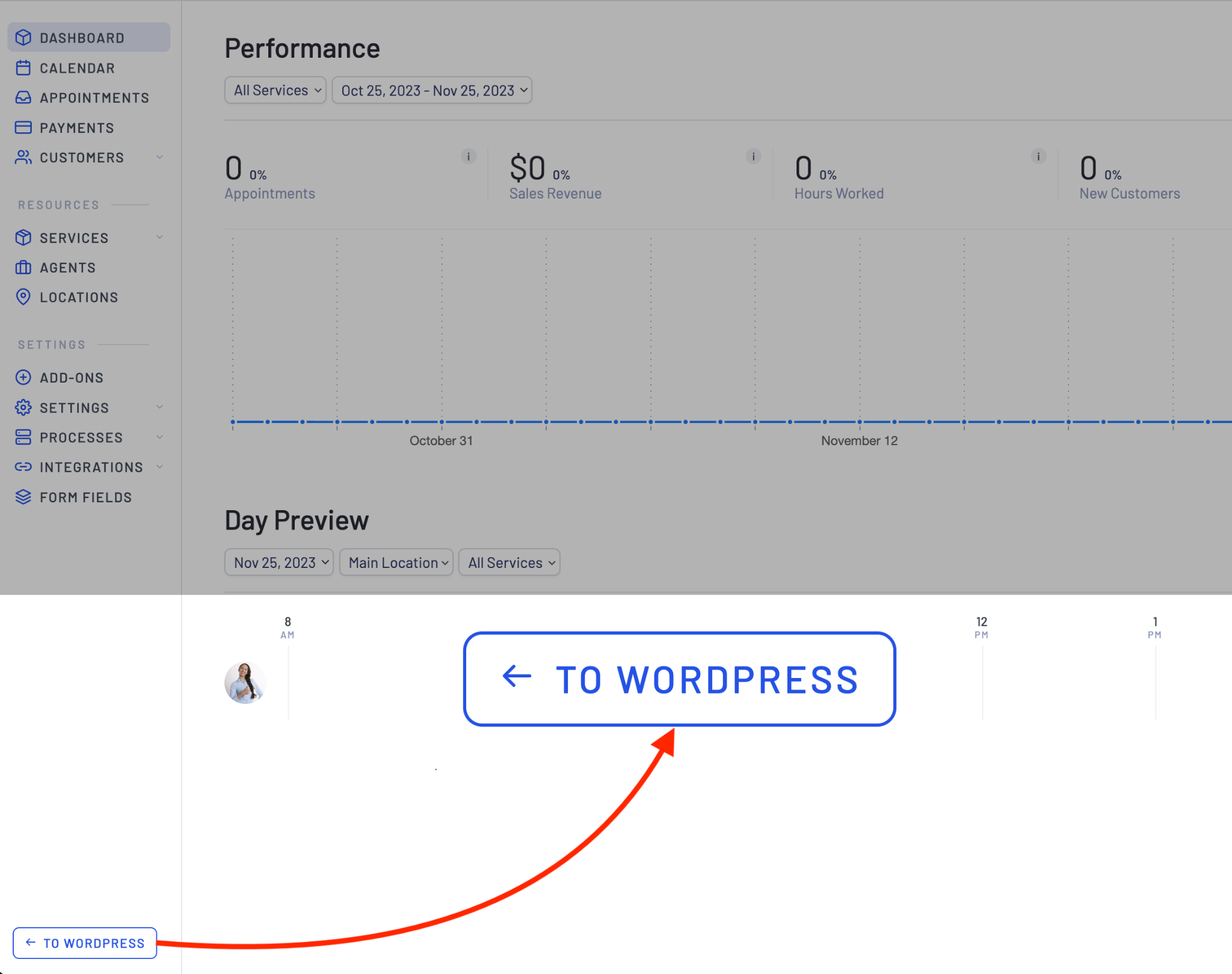
We’ll dive into each menu item soon to explore its features and how they can benefit your business.
Let’s start with the frontend.
LatePoint Frontend
After getting LatePoint up and running (with its default settings) on a fresh WordPress site, we went ahead and paired it with the Astra theme.
Specifically, we used the Happy Paw Starter Template, perfect for a made-up pet grooming business.
To make LatePoint work seamlessly on our site, we did these three things:
- We designed three specific pages: Book Appointment, Customer Dashboard, and Customer Login.
- We added LatePoint’s shortcodes [latepoint_customer_dashboard] and [latepoint_customer_login] to the Customer Dashboard and Customer Login pages. Also, we placed LatePoint’s booking form block into the Book Appointment page.
- We made use of LatePoint’s built-in booking button and placed it in the header, making it visible wherever we needed it.
What’s great about LatePoint is its simple setup. In just a few minutes, we got everything set up and ready to go!
Book an Appointment
Let’s watch the whole process in this video
There is also another unique feature that sets LatePoint apart from its competitors.
It has the ability to create a customer account separate from your WordPress users.
The idea is that you can handle appointments efficiently while keeping the two sides of your website separate.
Let’s set up a customer account.
Create a Customer Account
Setting up an account with LatePoint is easy.
A button labeled Create Account appears at the bottom of the appointment confirmation page.
Select a password and hit the Save button.
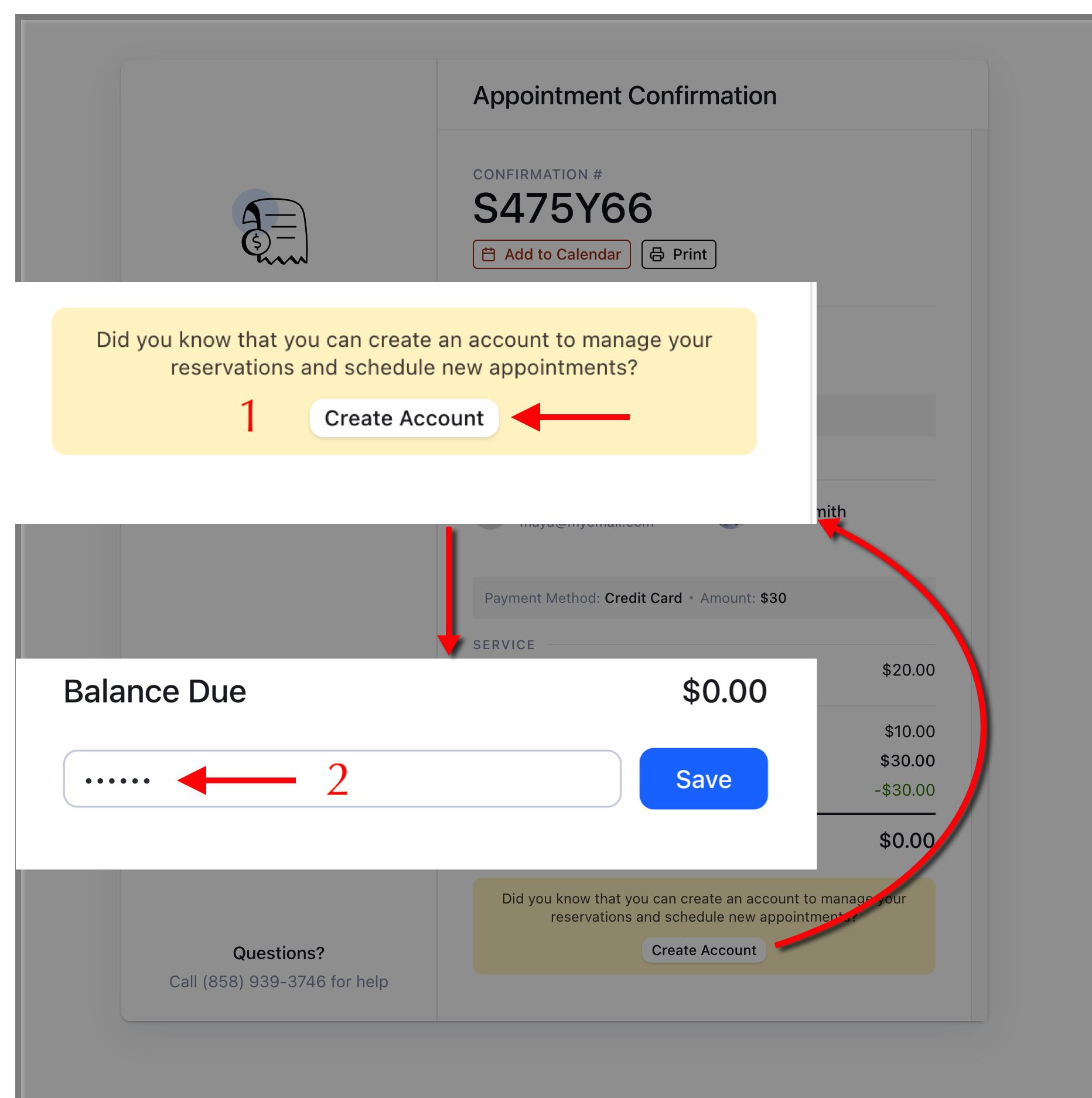
Customers will see the Open My Cabinet button once they have completed the registration process.
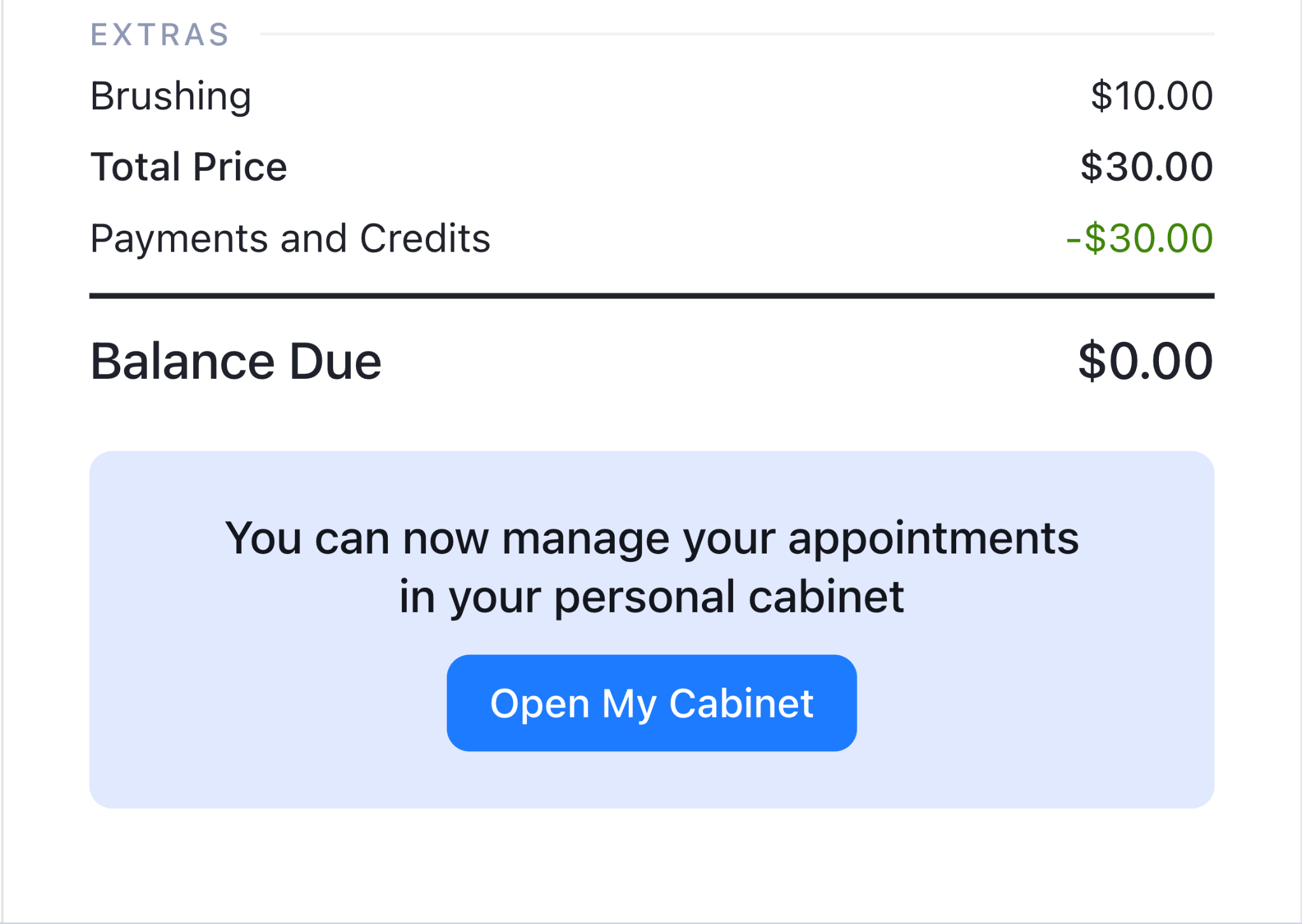
You’ll find all you need in the customer cabinet, which is intuitive and user-friendly.
You will have access to a variety of features, including your booked appointments, scheduling new appointments, and the ability to reschedule or cancel your appointment
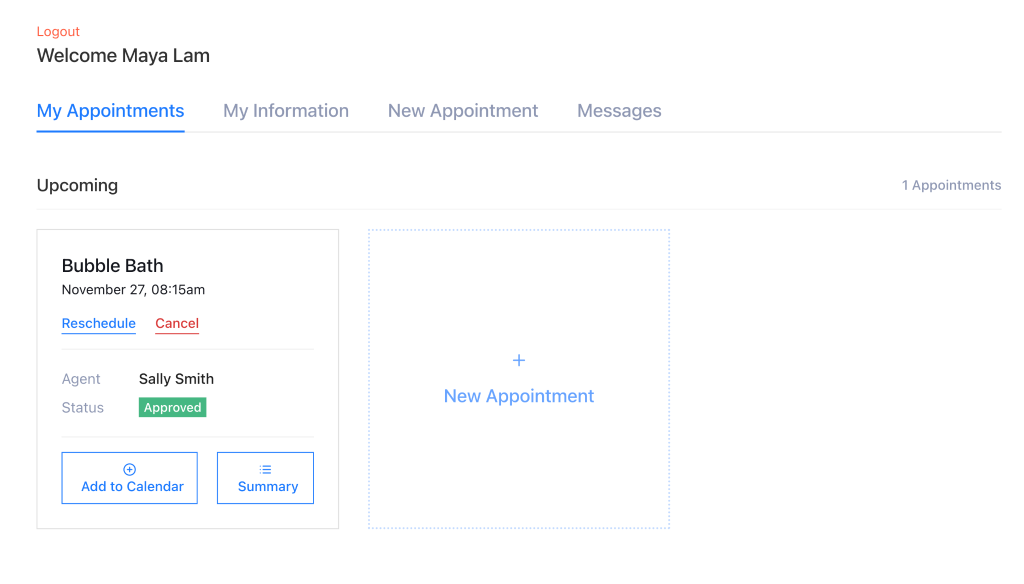
For example, when you reschedule an appointment, the change happens instantly without redirecting to another page provided the time slot is available.
To reschedule your appointment, simply click the Reschedule link and move your appointment to a more convenient time.
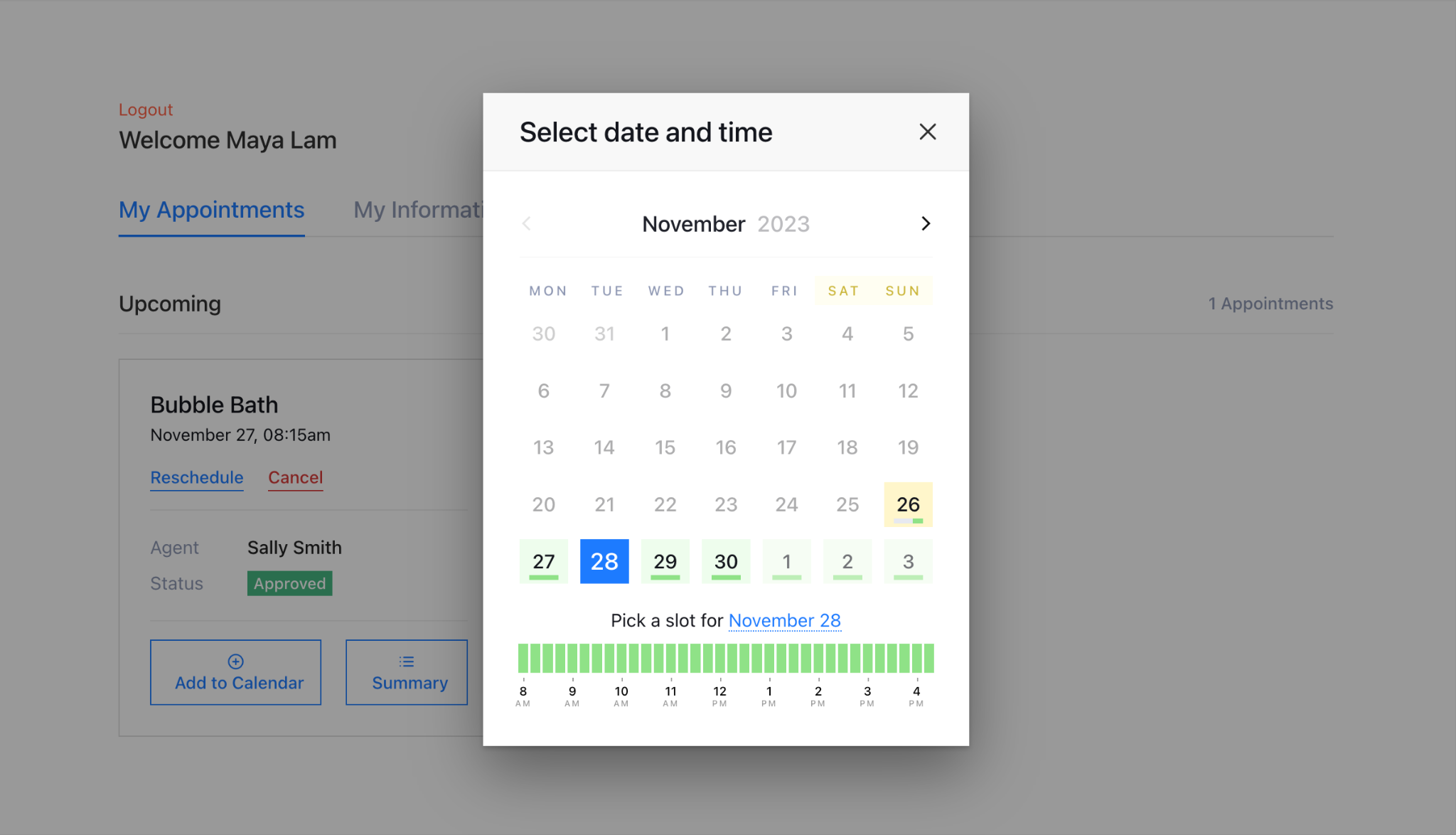
It would have been nice to have the option to change the agent if they are unavailable at the preferred time to answer.
That’s a shame but we anticipate having this option in an upcoming release.
While LatePoint does offer the option to cancel an appointment and schedule a new one, we’re hoping for a more direct approach in the future.
Cancel an Appointment
Canceling an appointment is quite easy as well. Click on the Cancel link in the dashboard and hit the OK button when the notification appears.
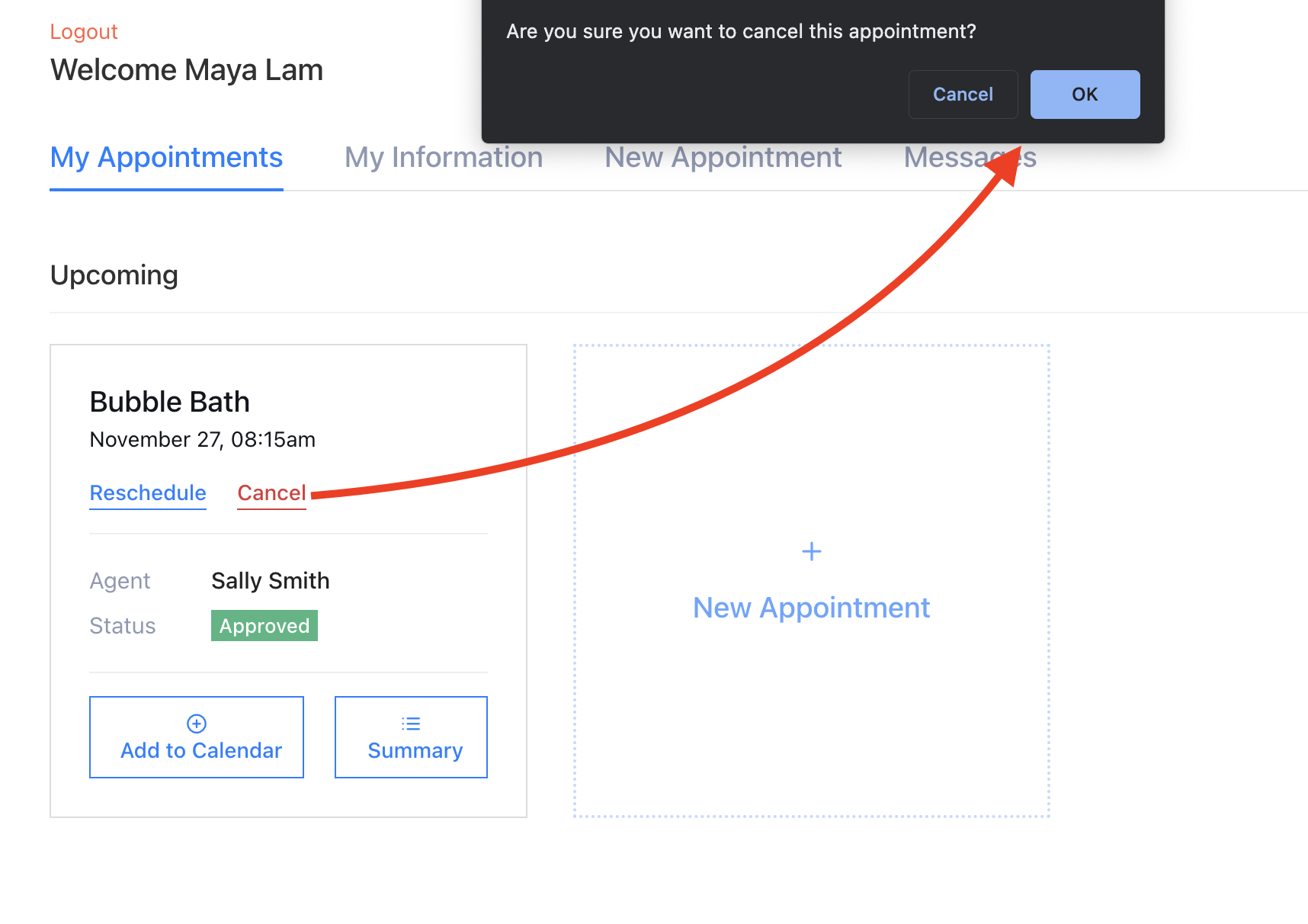
Once done, the dashboard will display the status as Canceled.
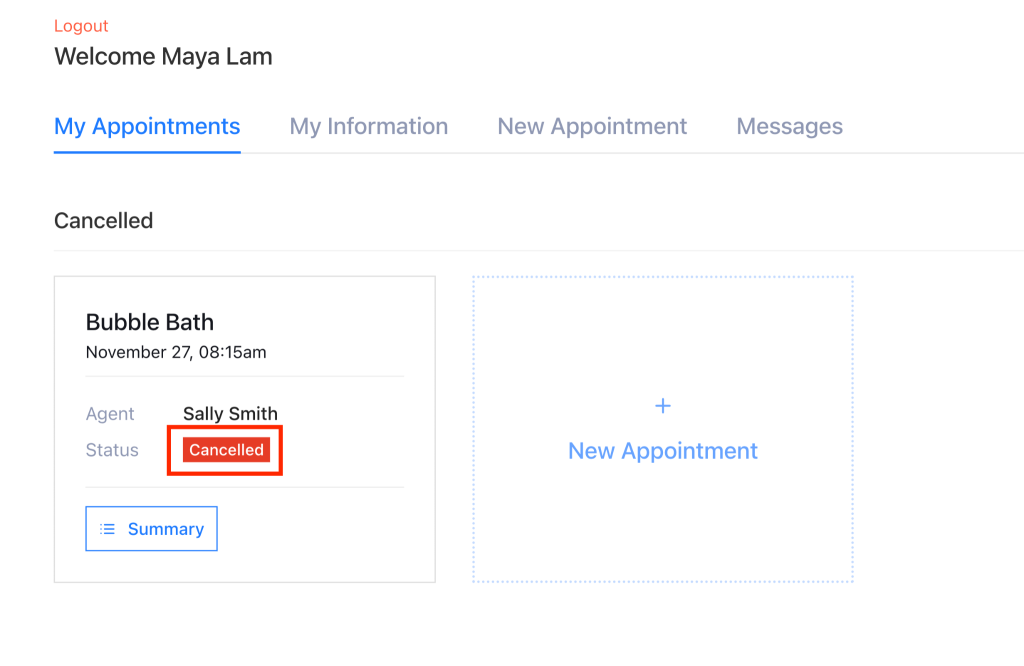
Customer Chat
For us, LatePoint’s Messages tab stands out as a top feature.
Customers can not only chat with your agents, but they can also use it to share documents.
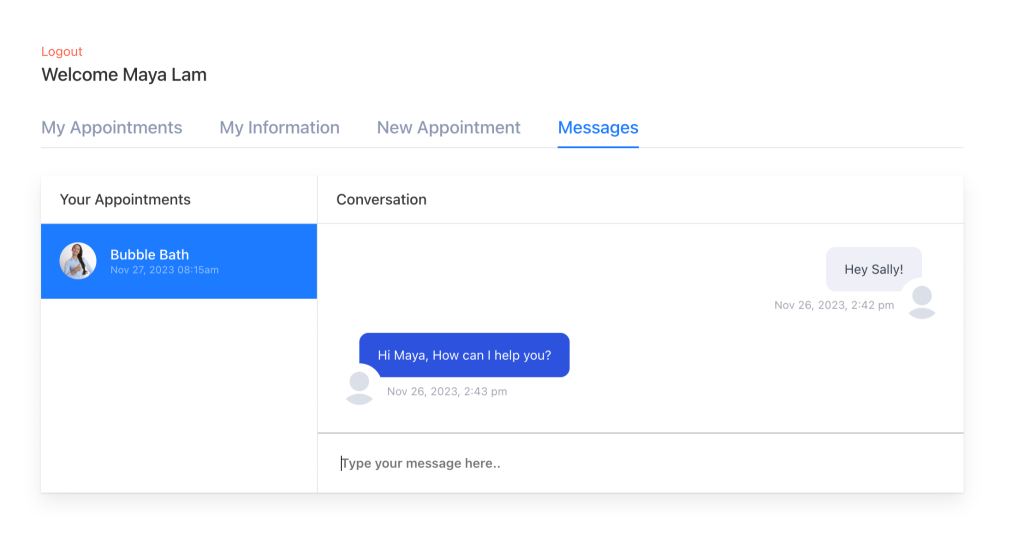
The customer may chat with any agent if they have booked multiple appointments with different agents.
We think this is a great way to keep all appointment-related details organized, make changes, or discuss anything important with the designated agent.
Managing LatePoint
To learn more about managing LatePoint, let’s dive into the backend.
Dashboard
In your dashboard, you’ll be able to see key details about your bookings, such as sales performance, upcoming appointments, and the availability of your agents.
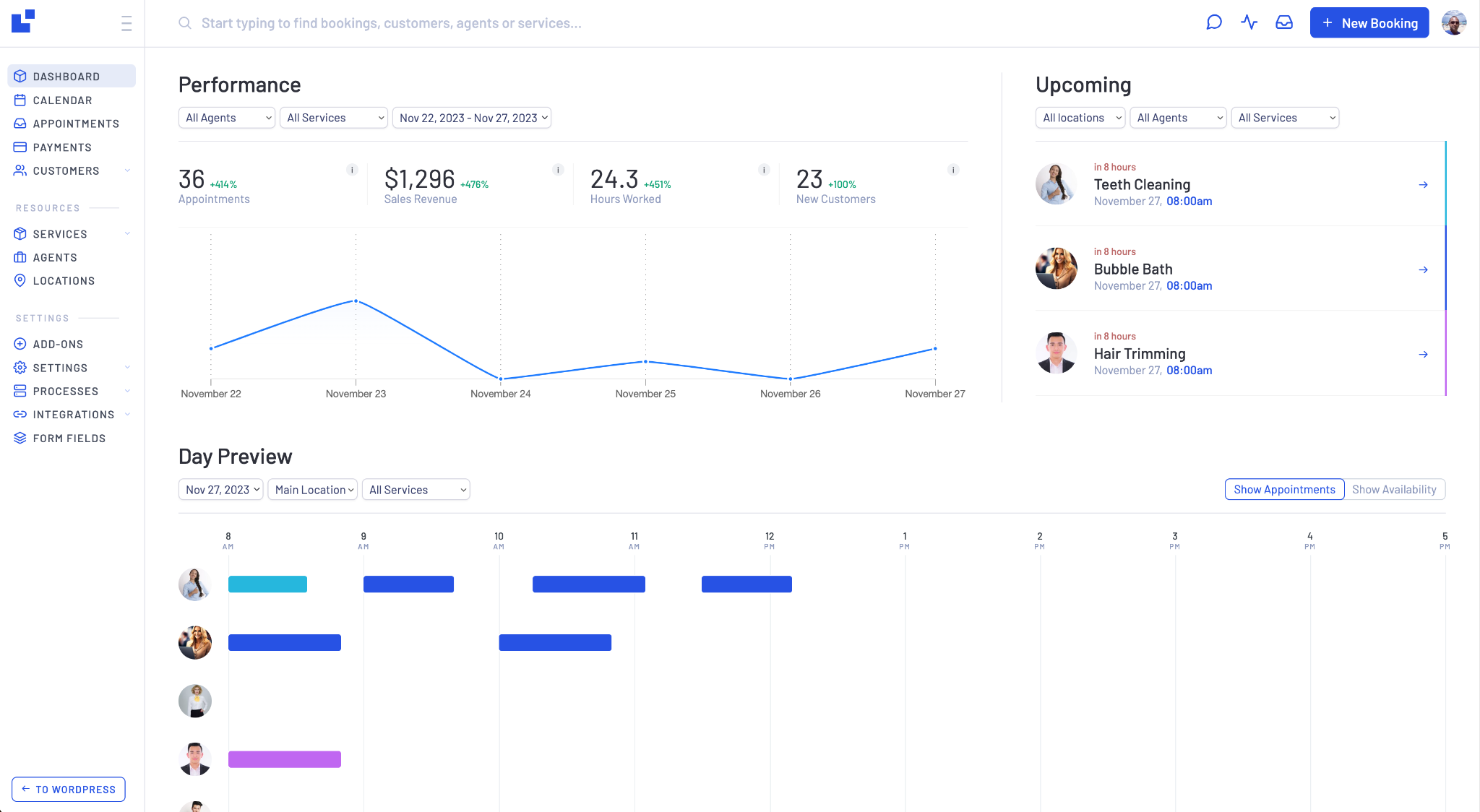
Performance widget tells you how many hours you worked, how much revenue you made, and how many appointments you have within a specific timeframe.
Utilize the filters at the top to refine your search.
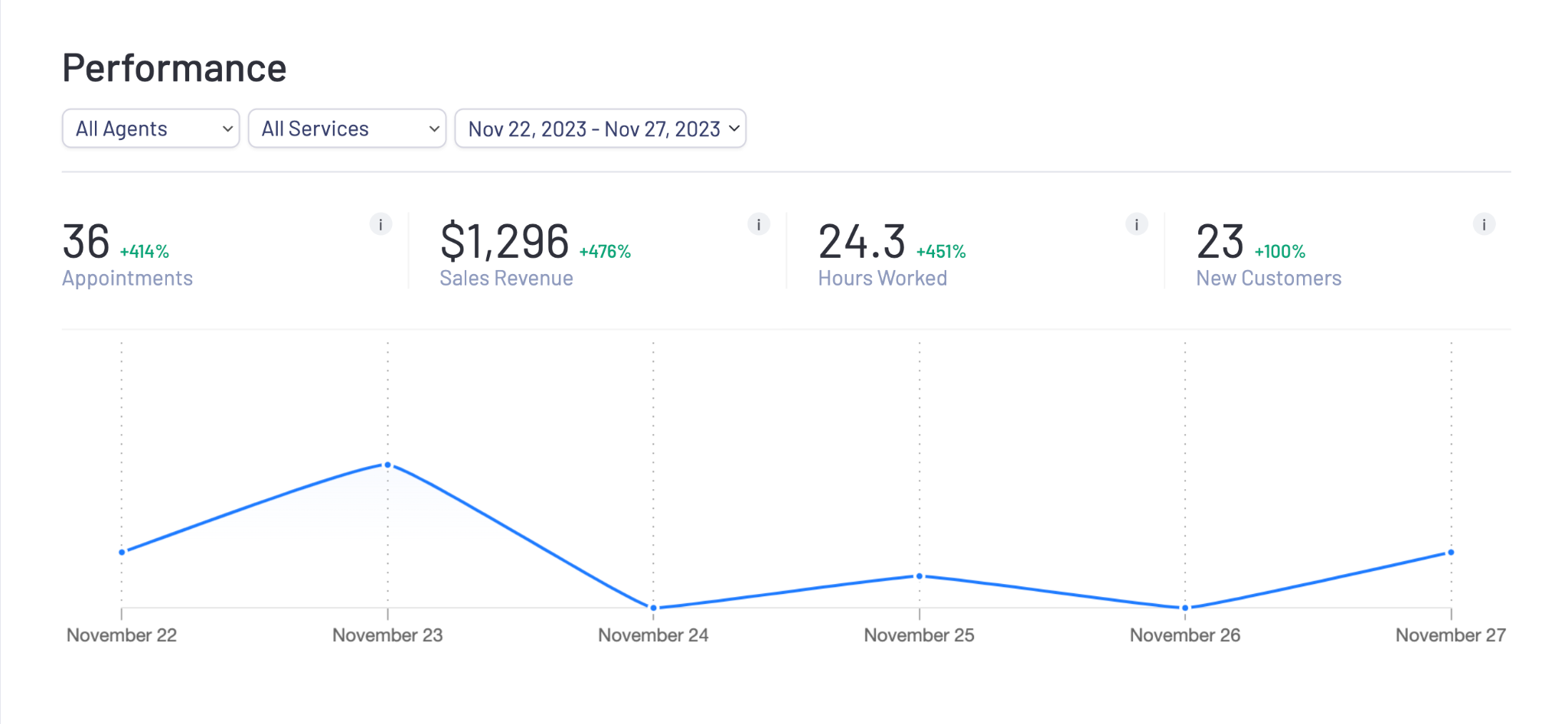
In the Upcoming widget, you can find details about all upcoming appointments, as well as filter based on specific agents, services, and locations of the business.
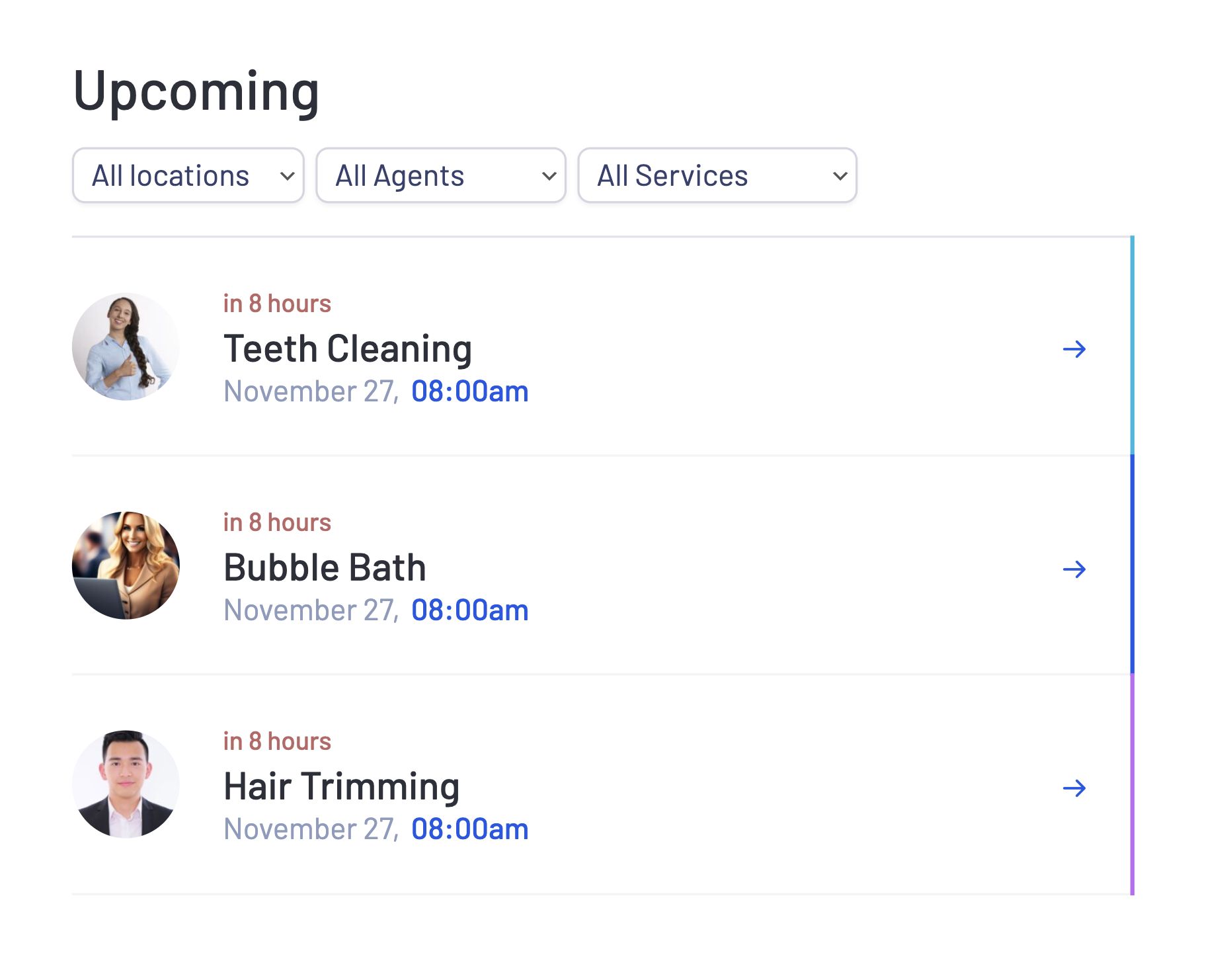
In the Day Preview widget, you will be able to view the upcoming appointments on your calendar. This is particularly helpful if you have more than one agent, as it provides you with a quick overview of your agents’ activities on any given day.
Use filters to swiftly narrow your search based on services and business locations.
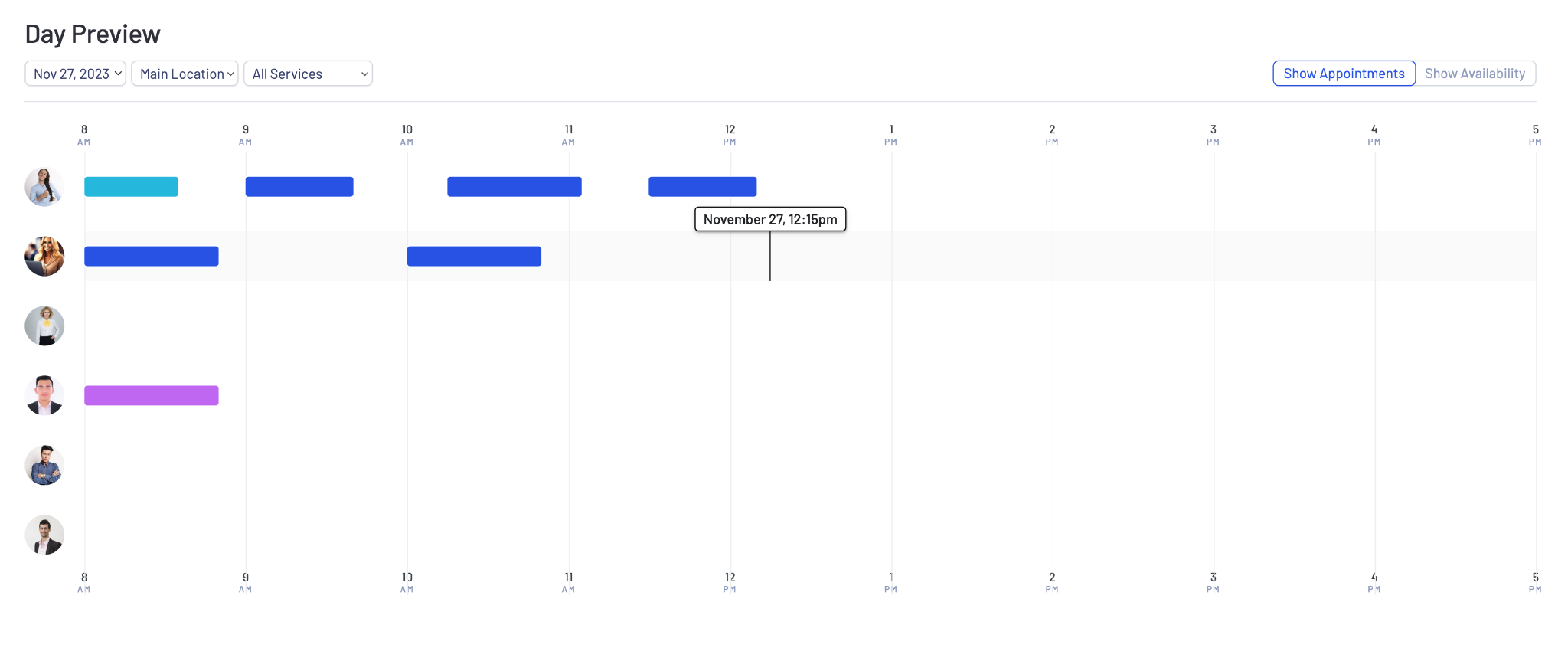
If you are interested in getting a quick overview of the availability of an agent on a specific day, the Show Availability button does the job.
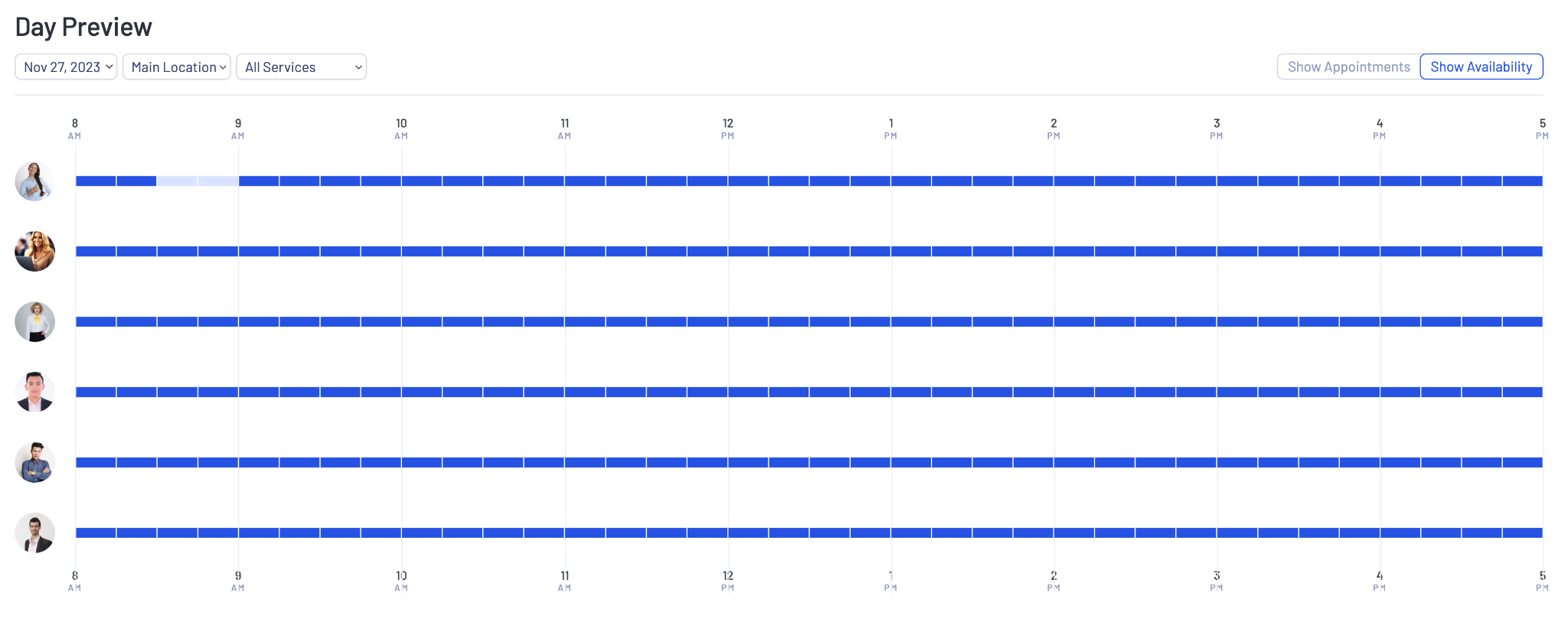
Addons
There is a great deal of importance attached to this area. These addons are truly what distinguish and elevate LatePoint as a booking plugin from the competition.
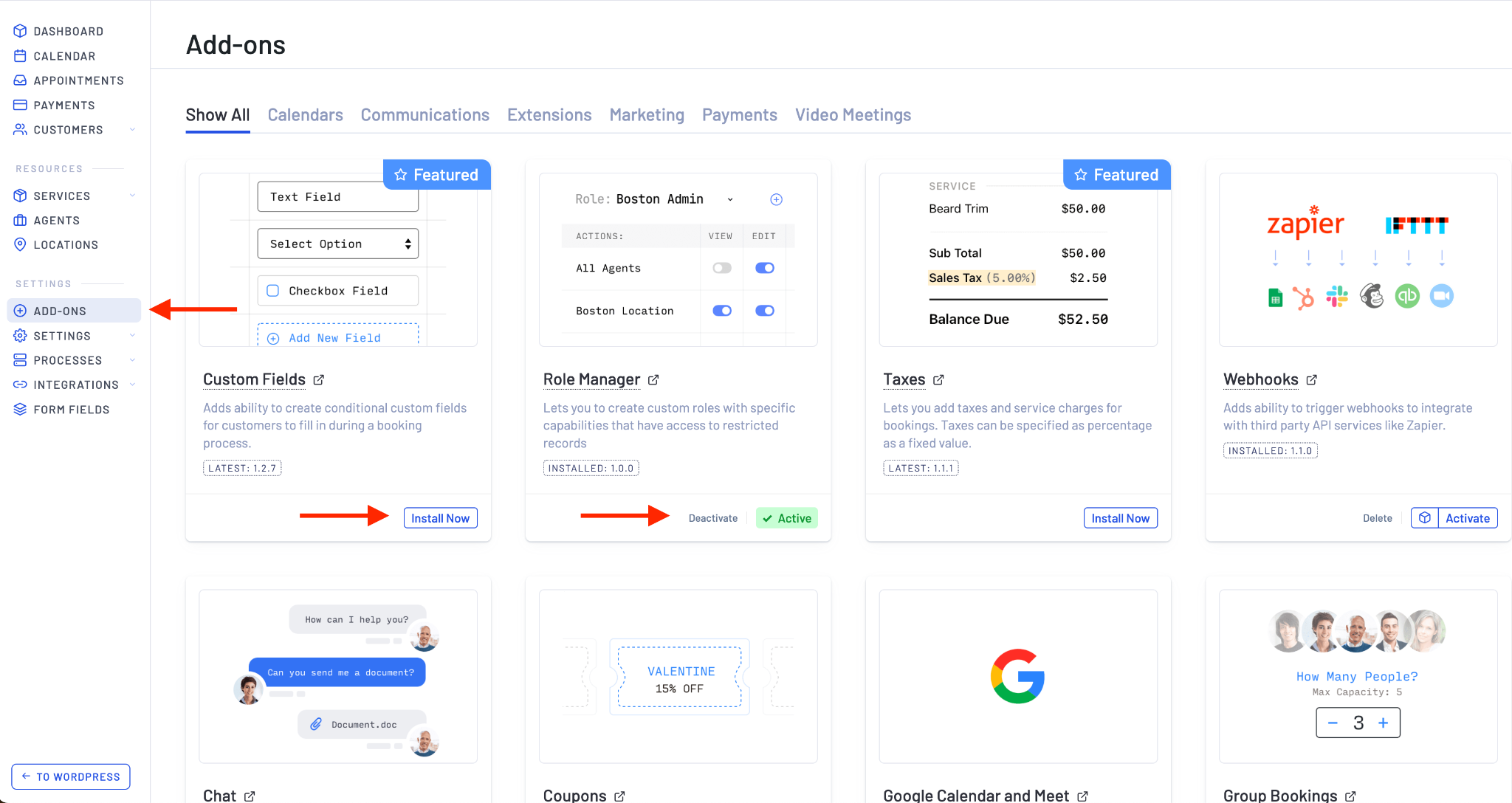
With these additional components, you can process payments, engage in customer chats, offer coupons, integrate appointments into schedules, and much more.
Addons work like plugins that you can easily install from LatePoint’s Add-ons section. It’s the same as installing and activating plugins in WordPress.
At the moment, 26 addons are included with LatePoint premium at no extra cost
Many of these are payment-related, giving you the ability to accept payments from a wide range of people around the world.
For instance, if your business revolves around online consulting or education, you can cater to customers worldwide.
Also, LatePoint makes sure your local payment system works smoothly, no matter where you are.
Here’s the list of all the current addons.
Custom Fields | Role Manager | Taxes | Webhooks |
|---|---|---|---|
Chat | Coupons | Google Calendar and Meet | Group Bookings |
Locations | Mailchimp | Braintree | FlutterWave |
Mercado Pago | Mollie | PayPal | Paystack |
Razorpay | Square | Stripe | QR Code Info |
Reminders | Service Durations | Service Extras | SMS Twilio |
TimeZone Selector | Zoom Meetings |
The following addons worked perfectly for our demo pet grooming business:
- Stripe: Accepts a variety of payment methods, including cards and iDeal.
- Chat: Enables direct communication and allows filesharing.
- Reminders: Sends SMS and email reminders both before and after appointments.
- Service Duration: Enables the addition of multiple service durations, each with its custom charge and deposit prices.
- Service Extras: Beneficial for enhancing primary services by adding extra features.
- Coupons: Lets you offer discounts during bookings using coupon codes.
- Google Calendar and Meet: Syncs events from Google Calendar and LatePoint bookings and lets you create video meetings.
- Role Manager: Enables the creation of custom roles with specific access restrictions.
- Webhooks: Integrates smoothly with SureTriggers and other third-party tools.
LatePoint Speed Test – Pro Tip
There’s a perception that having more plugins slows down your website. LatePoint’s addons were put to the test and we found that the performance of our website was not impacted at all.
First, we tested our website performance with GTmetrix without enabling any LatePoint addon.
At this moment, we only had three plugins active on our test site – LatePoint, Astra Pro and Spectra. Here’s what we got.
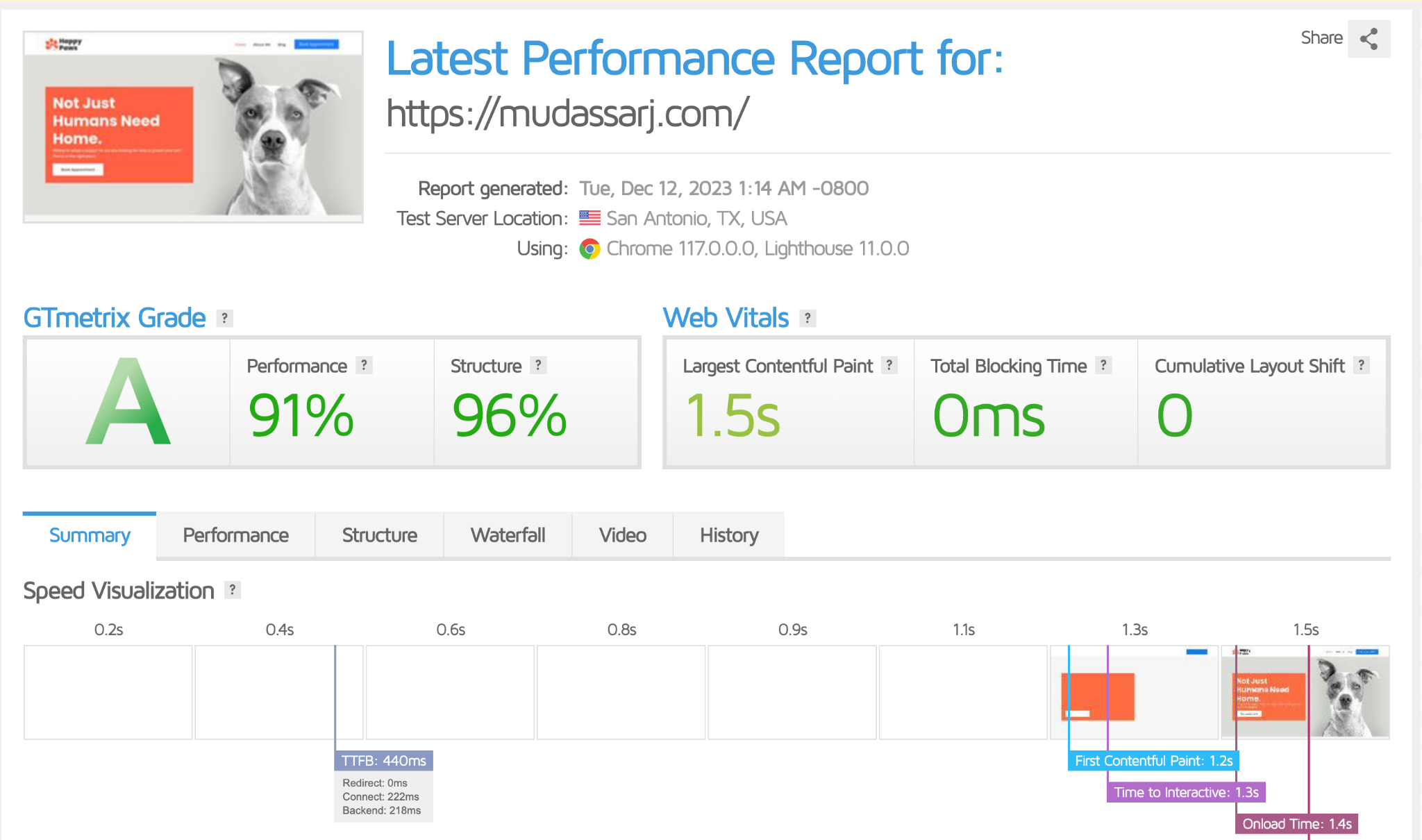
Then, we installed and activated 19 addons in addition to existing plugins.
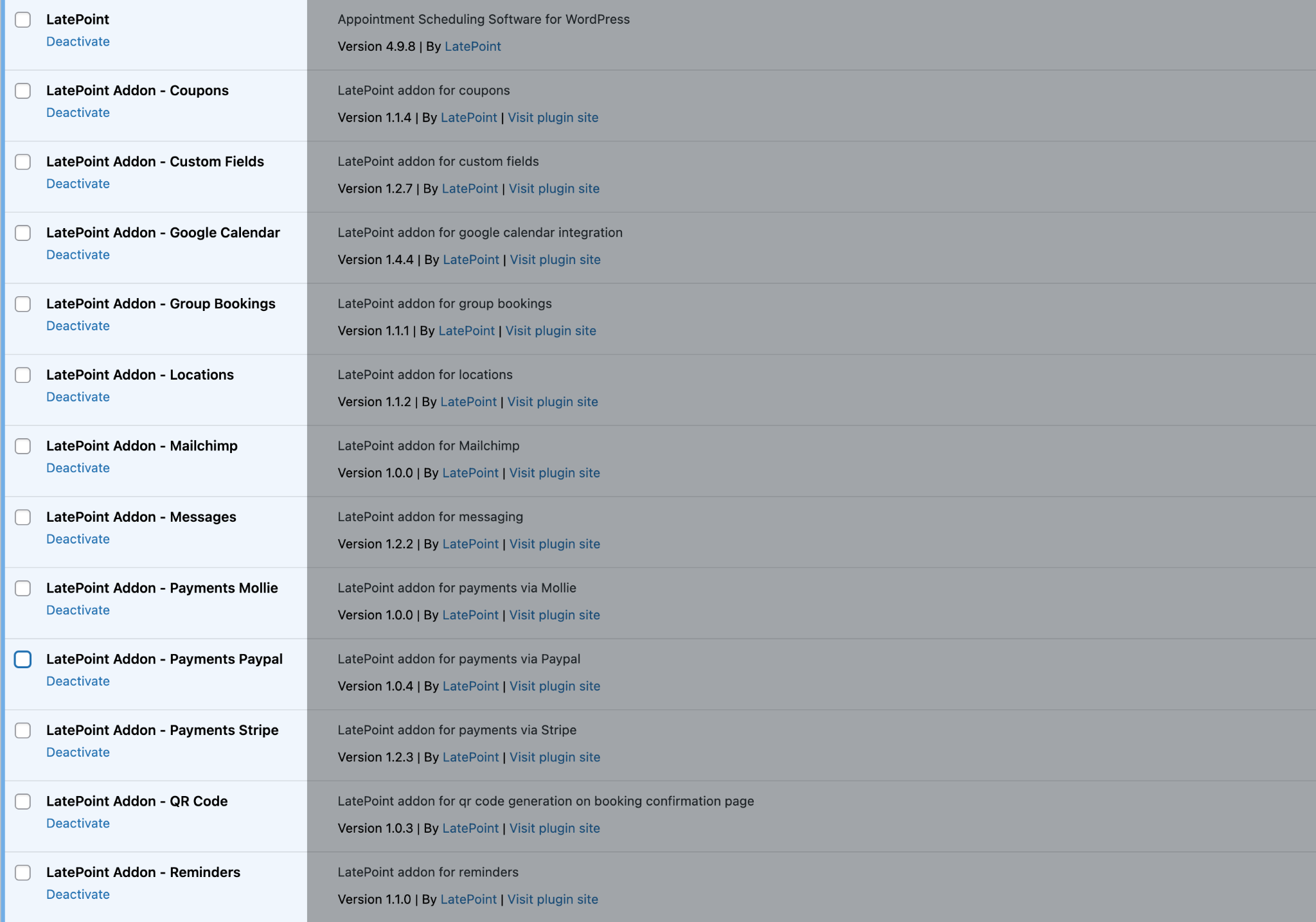
Here’s the result.
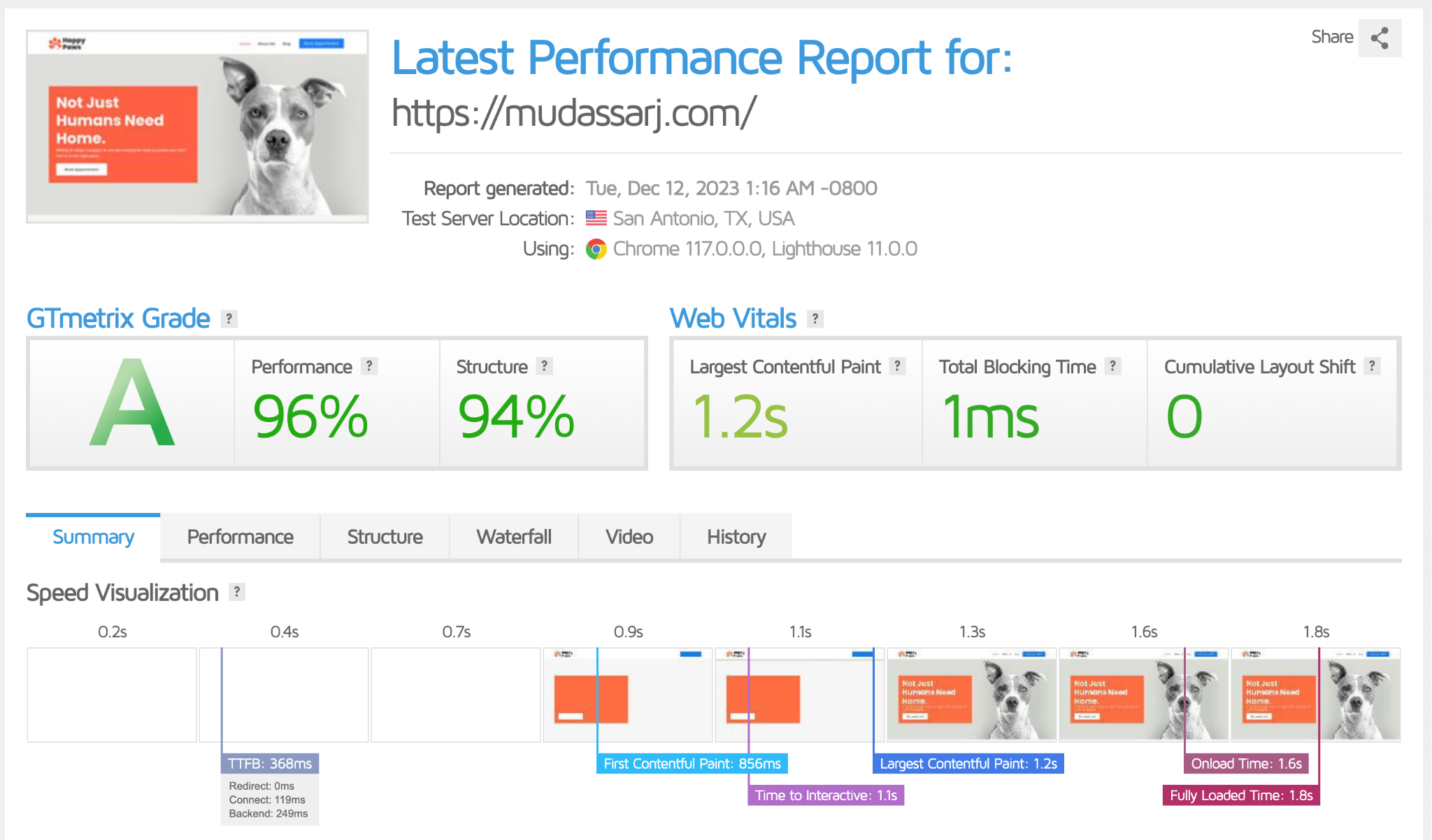
See, we added 19 plugins and the GTmetrix shows no performance drop.
Even if you enable all 26 addons, you’ll likely see no performance drop. Thanks to well coded plugins!
LatePoint Settings
In addition to addons, the Settings section is a vital hub. Here you’ll find a range of options to customize the plugin to suit your specific needs.
This section is neatly organized into 8 subsections including General, Schedule, Tax, Steps, Payments, Notifications, Role, and System.
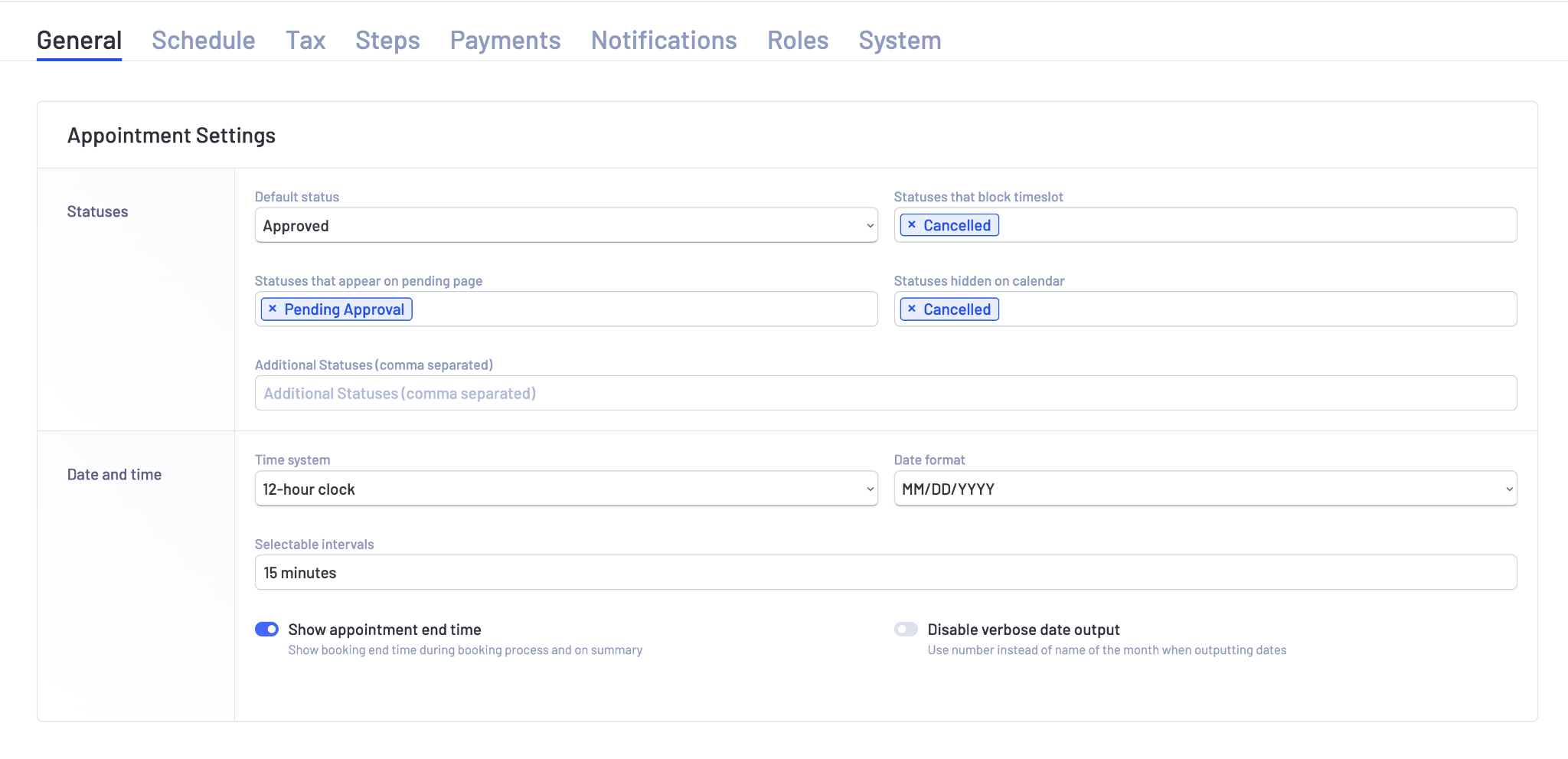
The best part about this section is its user-friendly interface, accompanied by clear, well-written descriptions.
Appointment Settings
LatePoint manages appointment settings with different Statuses.
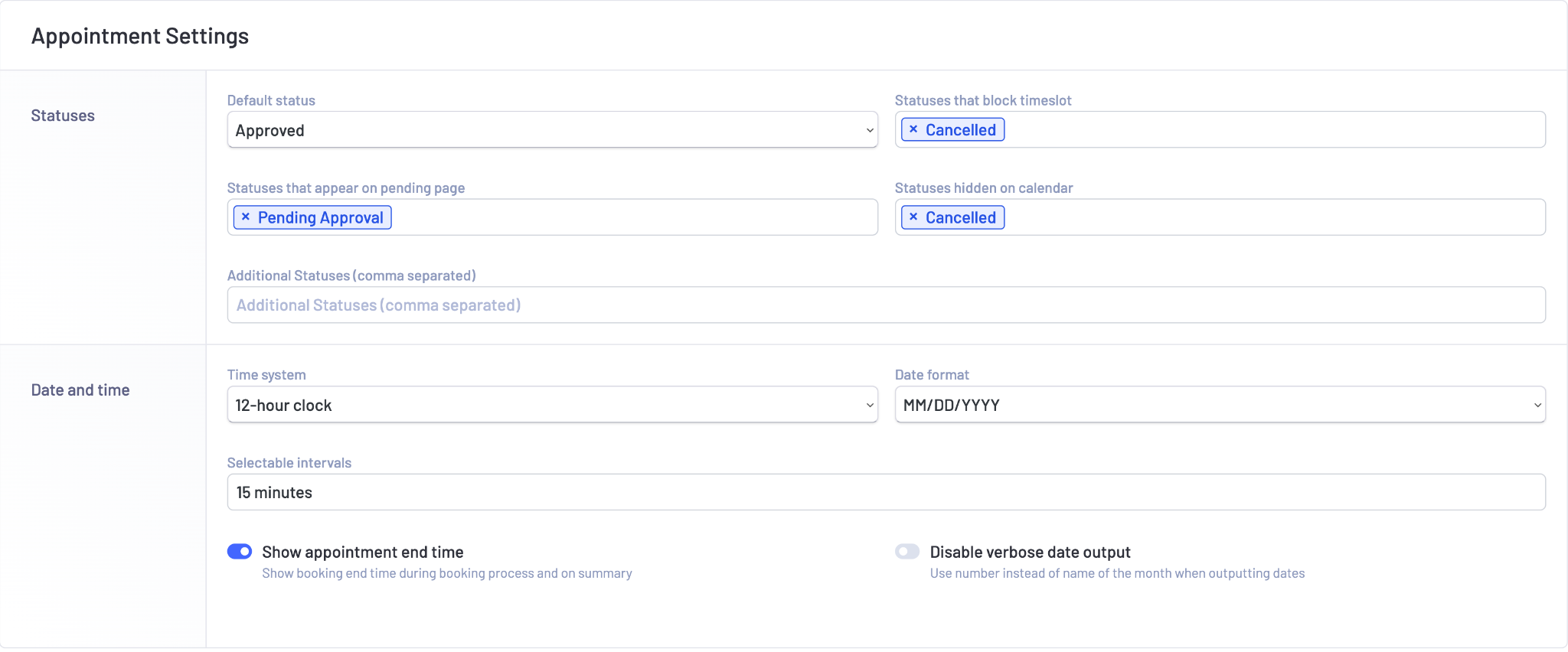
From here you can set the default status for all incoming appointments.
For example, when a customer schedules an appointment, you can categorize it as Approved, Pending Approval, Canceled, No Show, or Completed.

You might want to consider choosing the default status as Pending Approval. This will give you manual control over each booking.
With this status in action, all of your books will accumulate on the pending bookings page where you can approve or cancel them however you want.
You can track pending bookings very easily in LatePoint. They’re highlighted with a flash icon within the Day Preview widget. You can also get a notification in the top right corner.
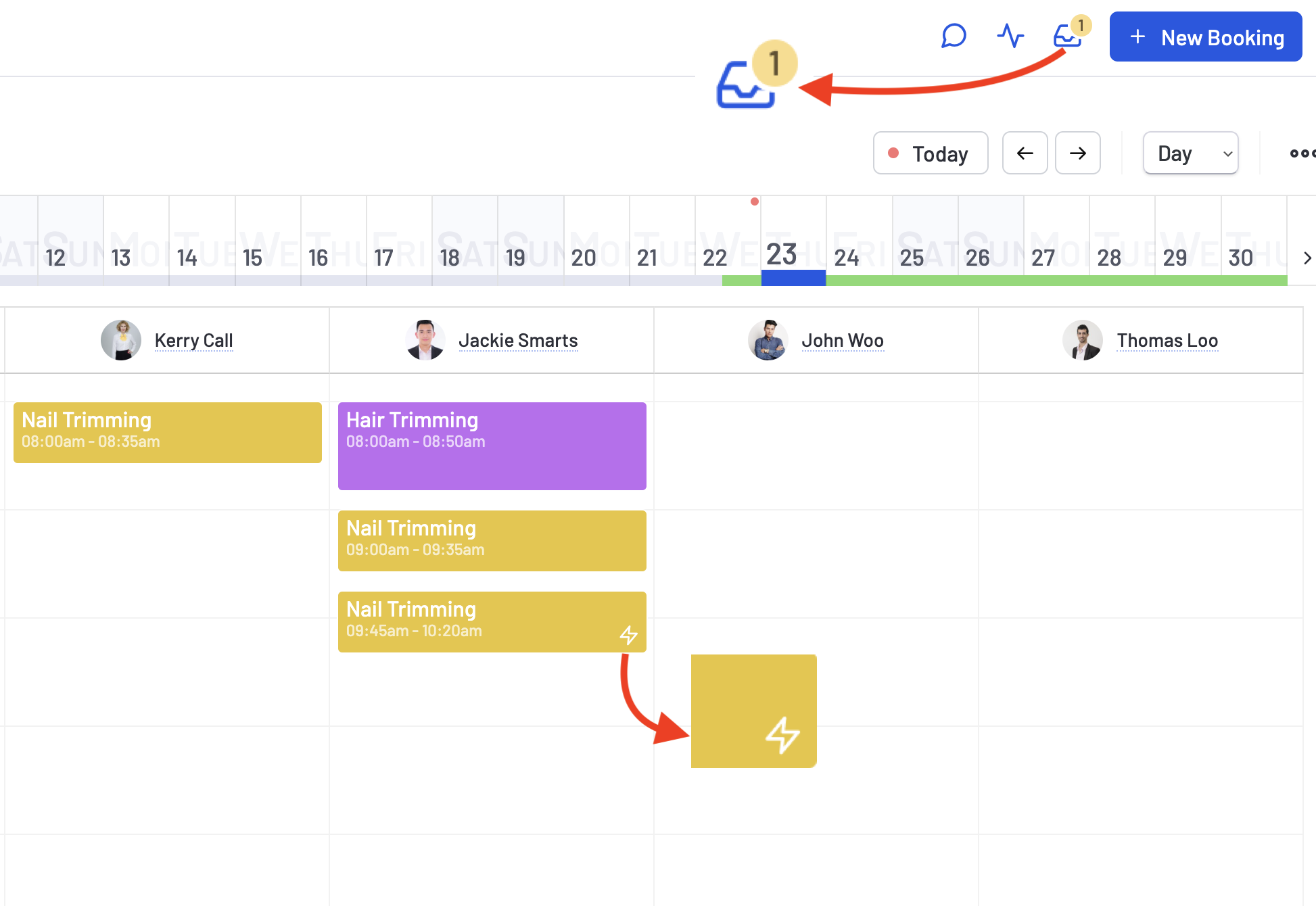
To access the pending bookings, click on the pending booking icons at the top.
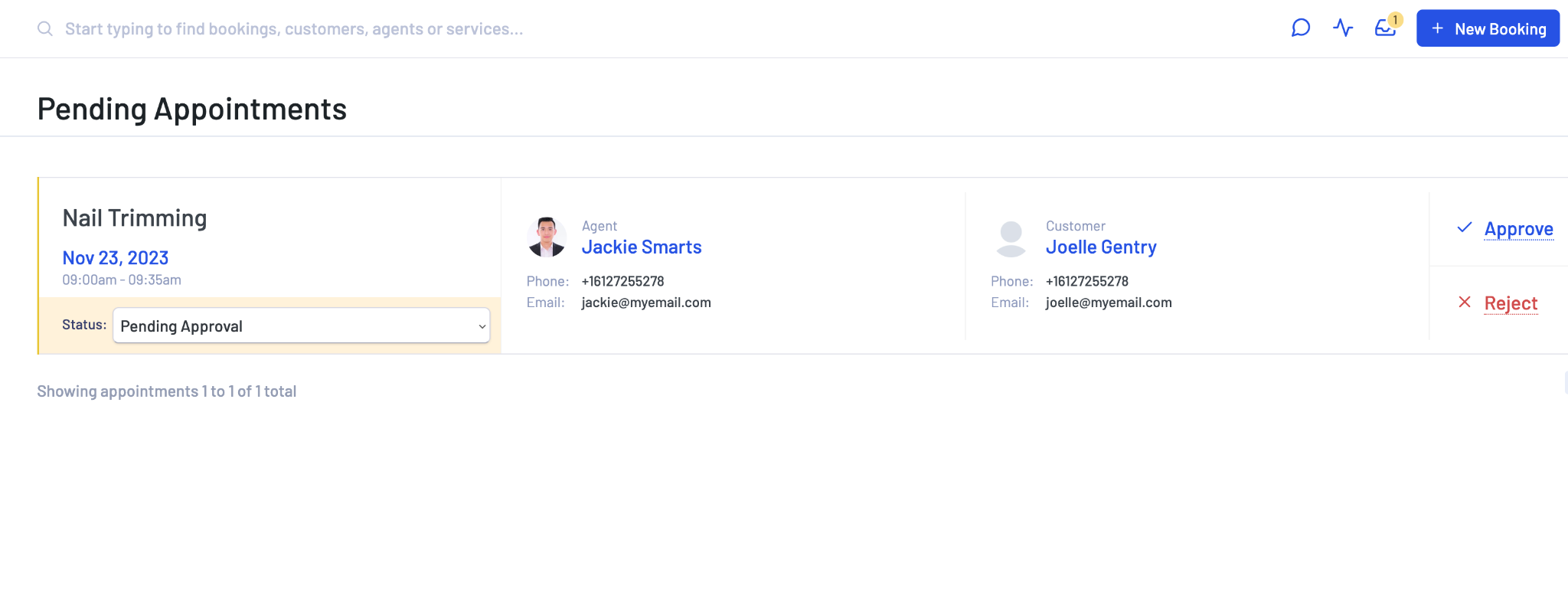
We appreciate this option in LatePoint that allows us to incorporate custom statuses.
To add a custom status, select the Additional Statuses field and add whatever suits you. Use commas separation if you’re adding multiple statuses.

These new statuses will appear after you hit Save and refresh the page.
At this point, we have another observation. It would be nice to have a sticky save button, which would eliminate the need to scroll all the way down.
It would also be easier for users if they didn’t have to refresh the page all the time.
Restrictions
The Restrictions setting area lets you limit customers from scheduling appointments on particular dates.

You can set the maximum and minimum limits. For instance you or your agents are available after 3 days until the holidays start after 10 days.
With the Restrictions option, your booking calendar will show your customers only those 7 days.
Here’s how it’ll be presented to customers:
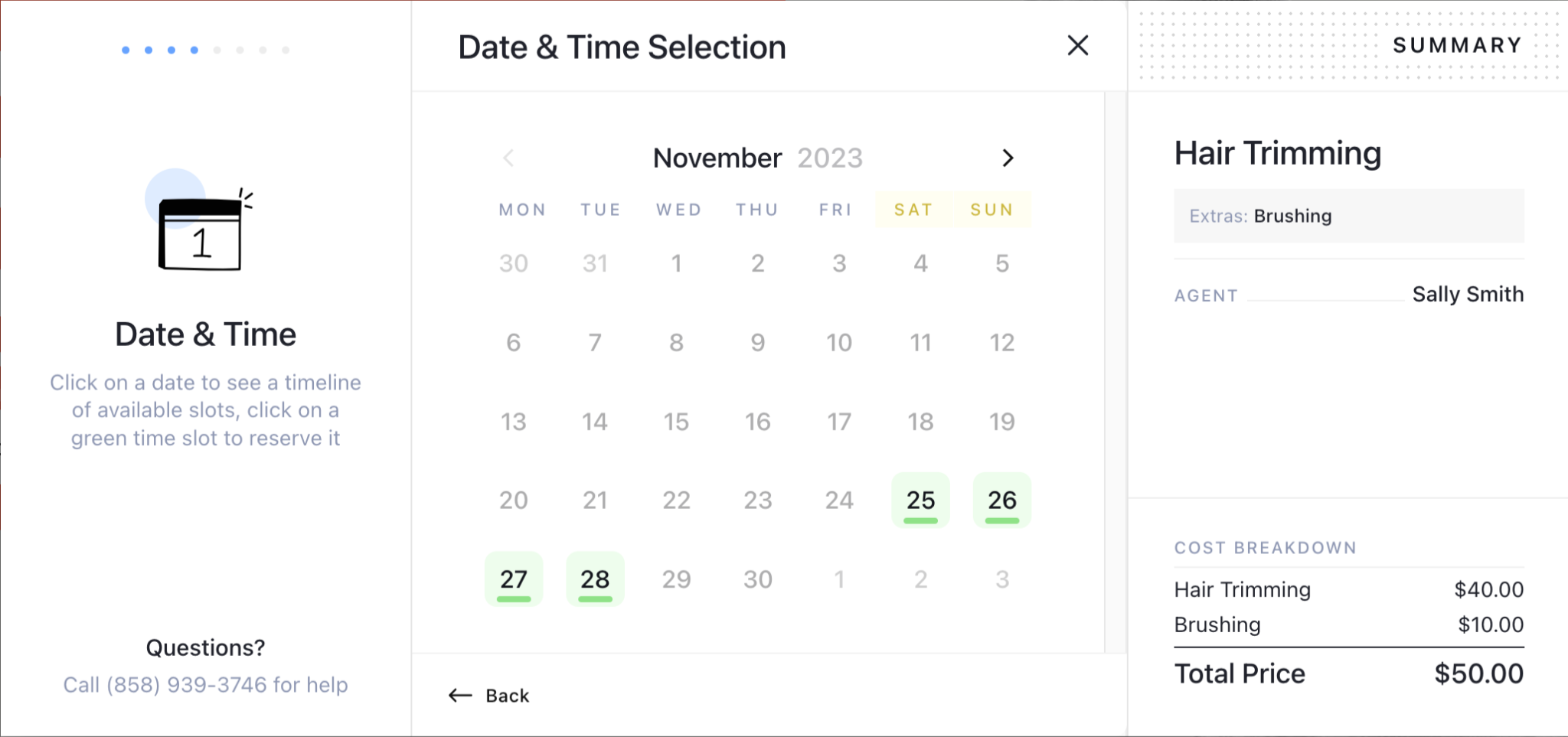
You can choose a relative value, like we did in our example, or input a specific date.
Customer Settings
Appointment cancellation and rescheduling are powerful features. You are able to determine how far in advance customers can reschedule or cancel their appointments, which is great for resource planning.
When a customer reschedules an appointment, you can determine its status.
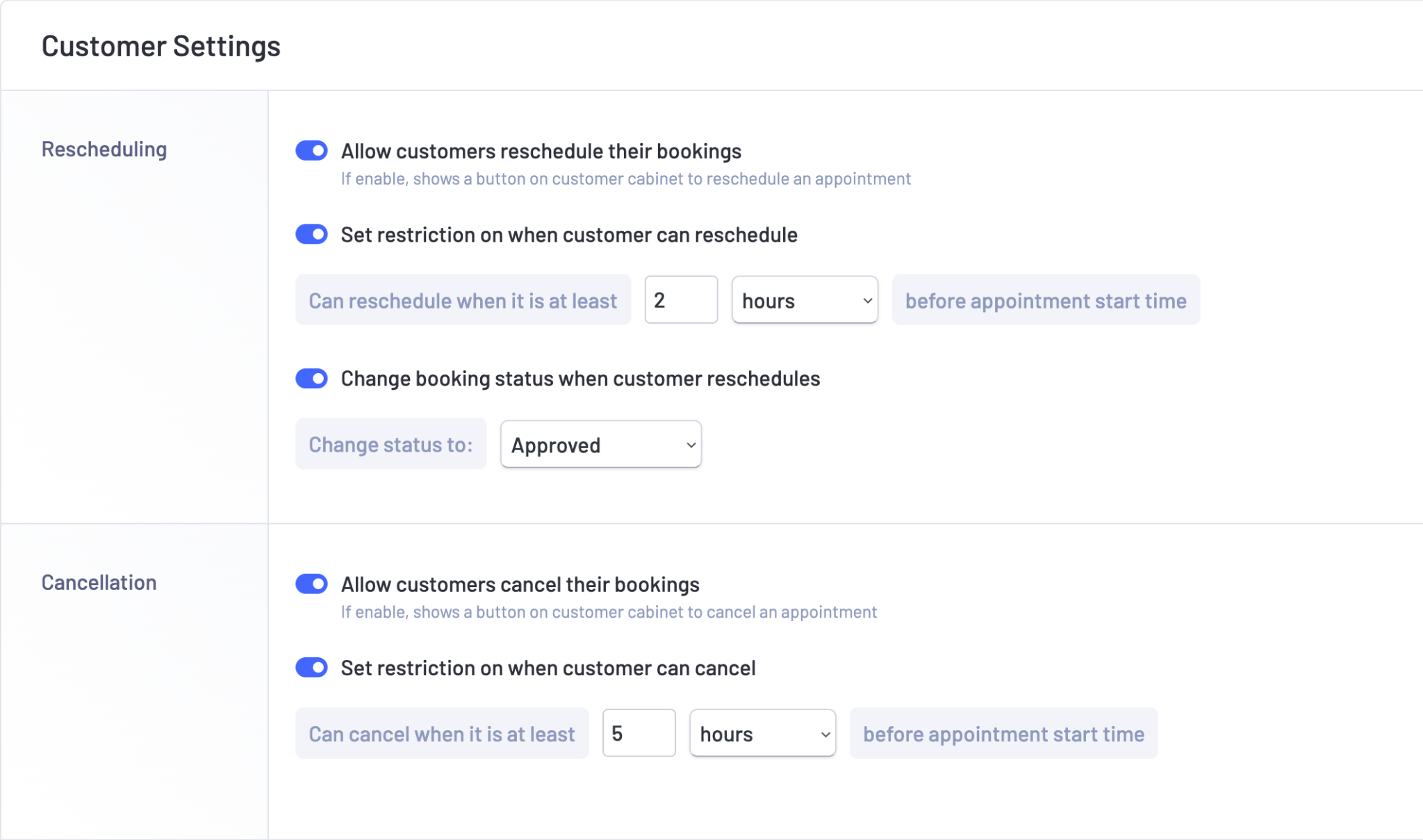
Here are options within the customer cabinet:
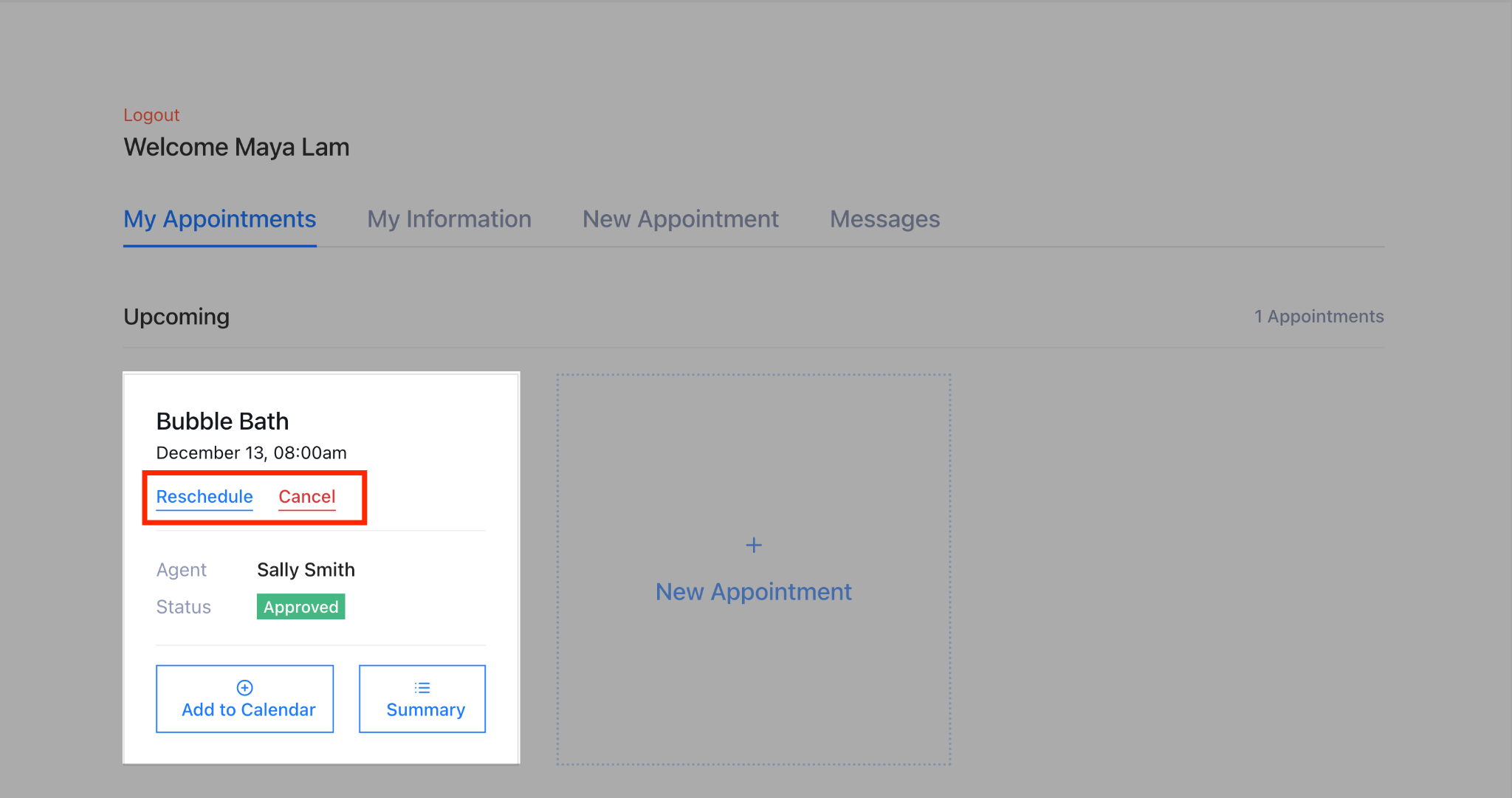
The customer settings area has some pretty useful options to help improve the customer experience.
For instance, you can get a short code to place the booking form wherever you like or you can allow customers to login using their WordPress credentials.
You can also allow them to login via Google or Facebook.
Schedule – Customize Your Availability
LatePoint offers robust schedule customization features. We only set the weekly timetable earlier during the setup phase.
From the settings area (Settings > Schedule), you can manage schedules beyond typical weekdays.
For instance, if you wish to personalize the schedule for a specific day of the month, distinct from your regular weekdays, the Days With Custom Schedule widget is the place to make those adjustments.
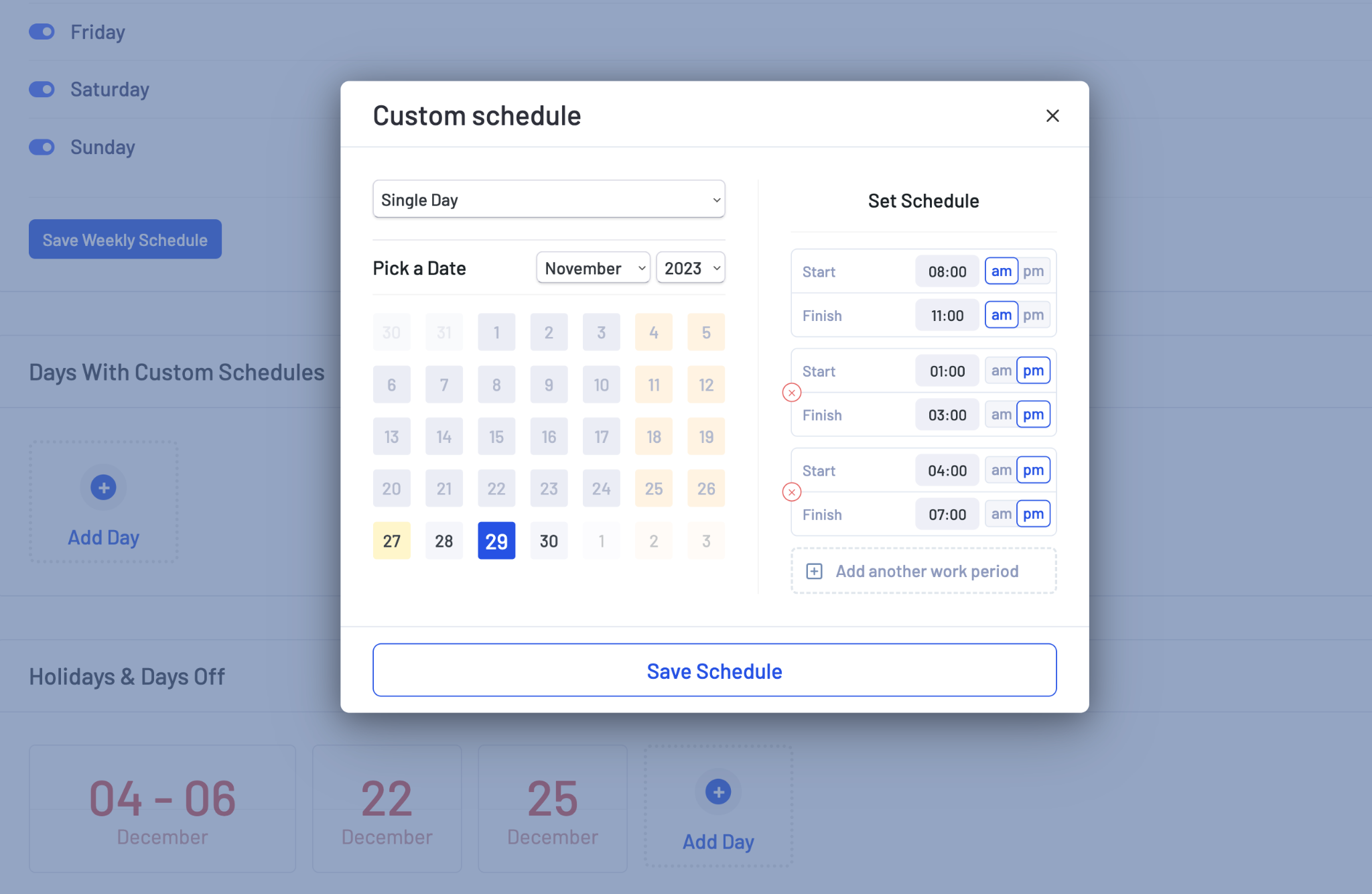
You’ll find the Holidays & Days Off widget on the same page if you want to incorporate holidays into your booking calendar.
With this feature, you can specify a single day or choose a range of dates to highlight the holiday season.
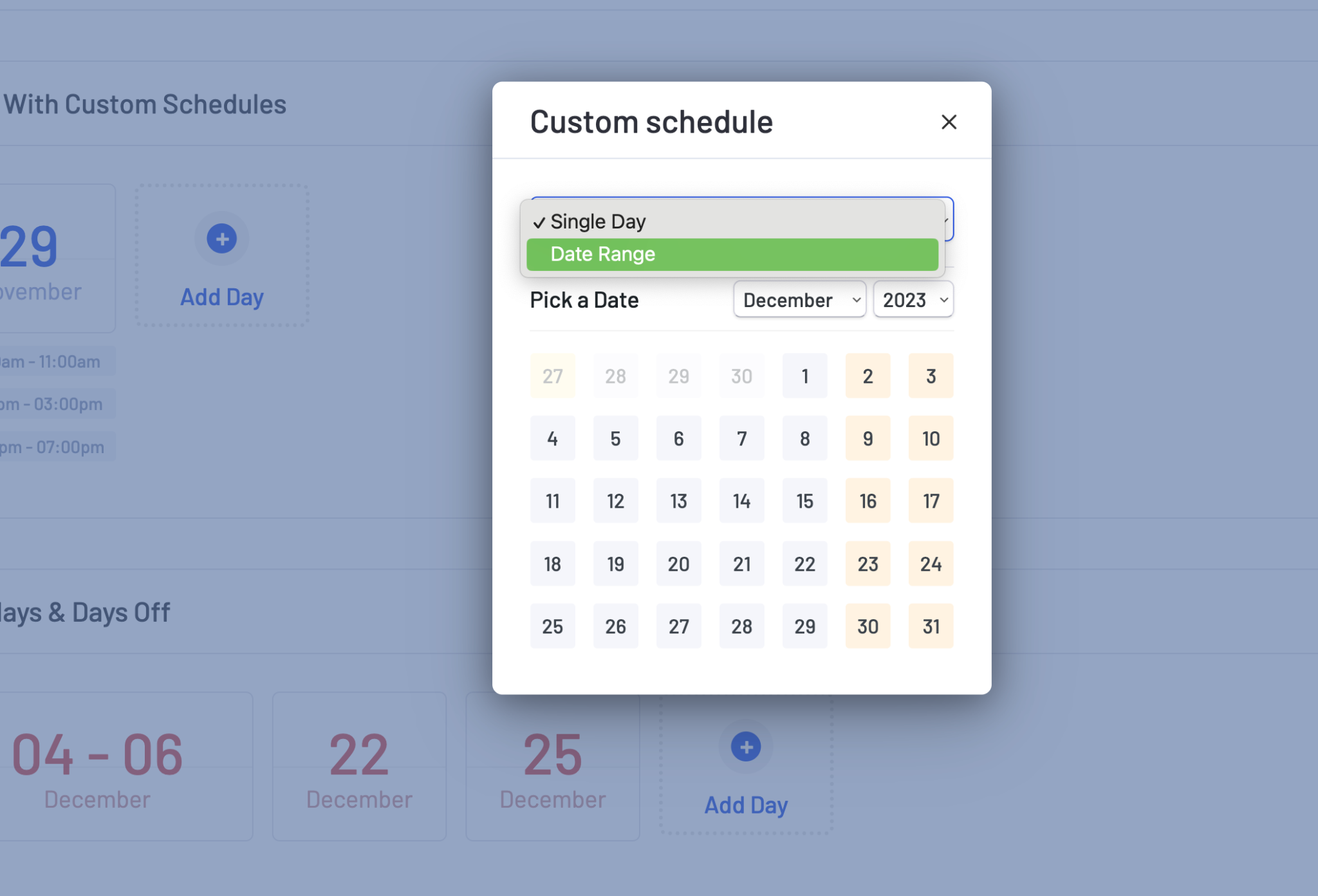
Steps – Change the Order of Your Booking Form
Depending on your needs, you may want to let your clients choose agents first before selecting services.
You may also allow them to pick a schedule first before doing anything.
You can achieve this from the Steps page.
There, you have the freedom to rearrange each step of your booking form to align with the flow that suits customers best.
It is as easy as hovering your mouse over the small dotted icon on the left of each step, clicking, and dragging it to the desired position.
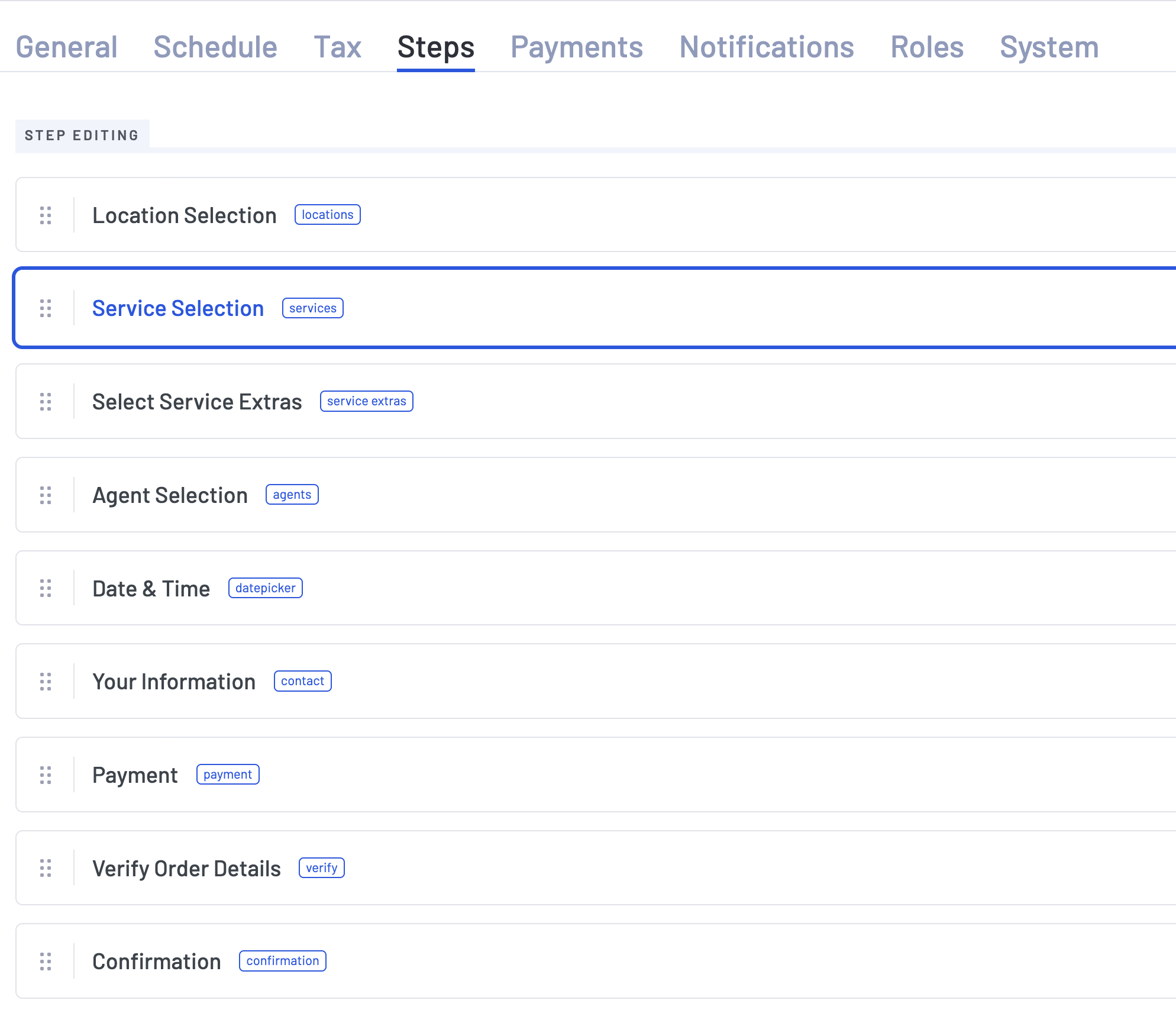
You can add significant value to your booking form by enhancing the user experience further. Within the Step Editing widget, navigate to Booking Form Settings.
These helpful options can streamline your booking form and potentially reduce instances of abandoned bookings.
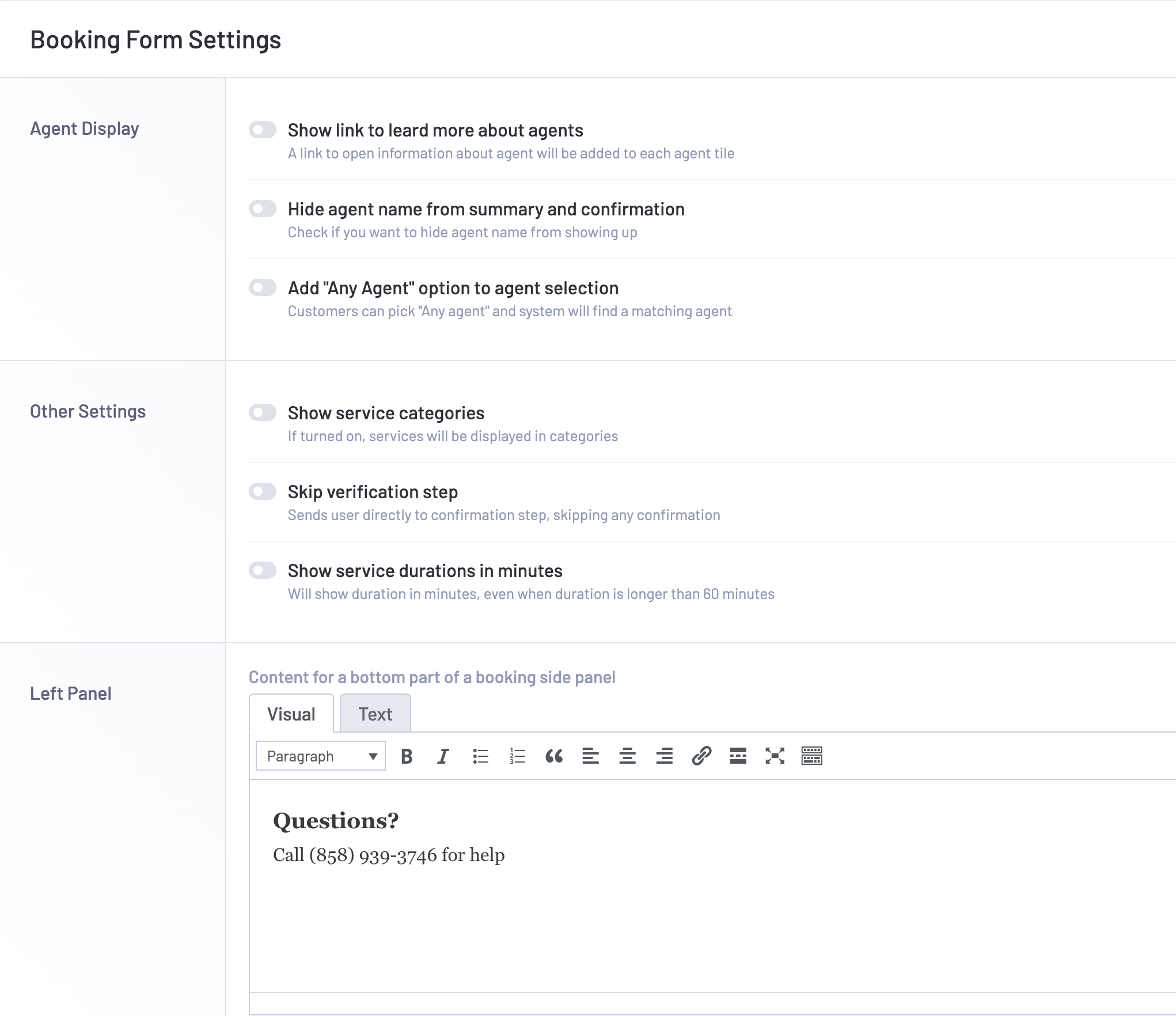
For example, you can eliminate the verification step from your booking form, trimming down an extra hurdle.
Similarly, you can display service durations in minutes, provide more information about agents, or customize details on the left panel of the form.
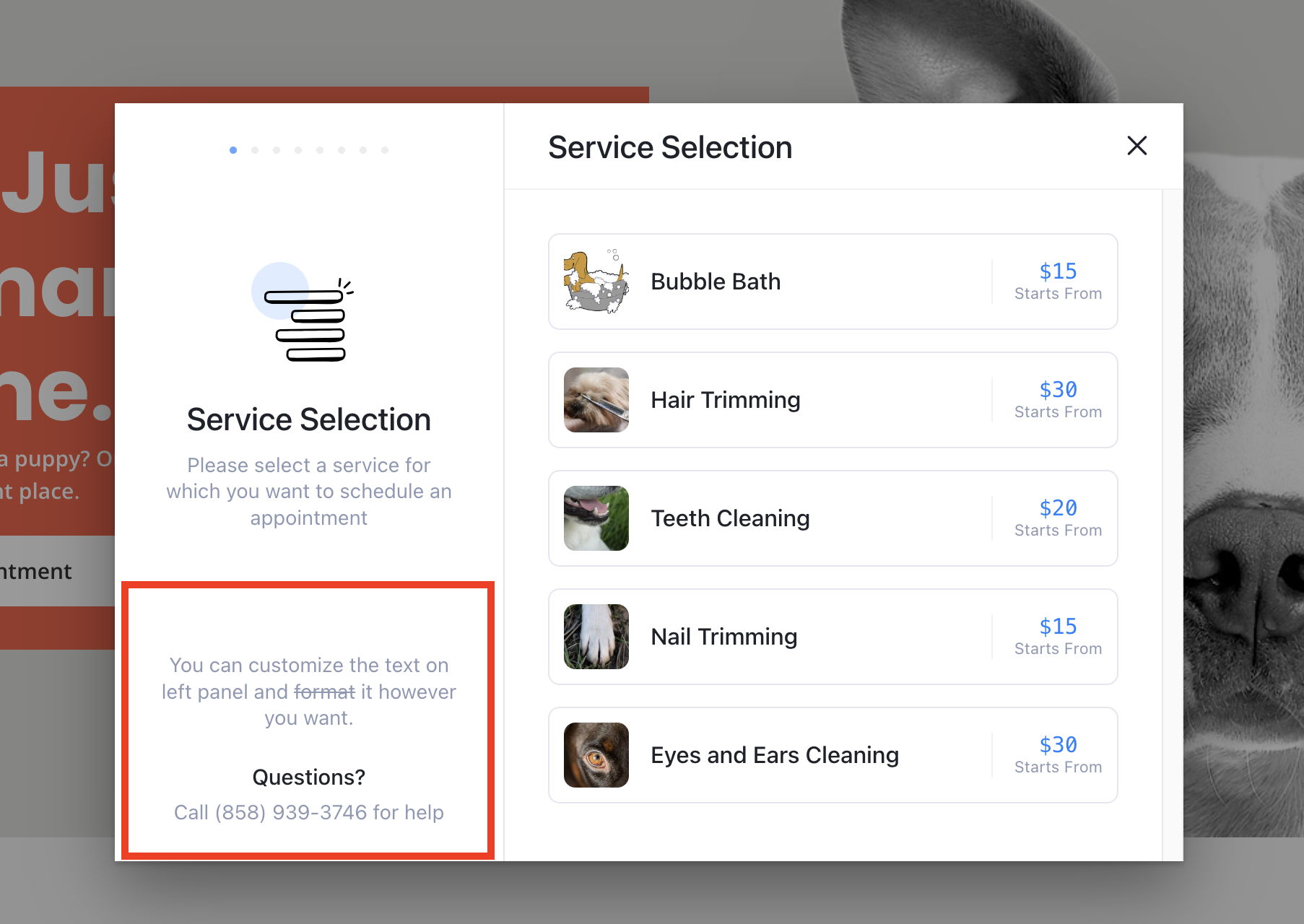
During our testing, some formatting commands didn’t function as intended. We’re hopeful that these issues will be addressed in the upcoming version.
Payments
LatePoint has many other perks to offer, but its Payment feature is one of its strongest.
The whole process of receiving payment can be completed quickly and easily.
Not only is it simple, you can accept payments from a wide audience, thanks to the support for multiple payment gateways.
All you have to do is install your preferred payment plugin from the Add-ons page and activate the payment processor.
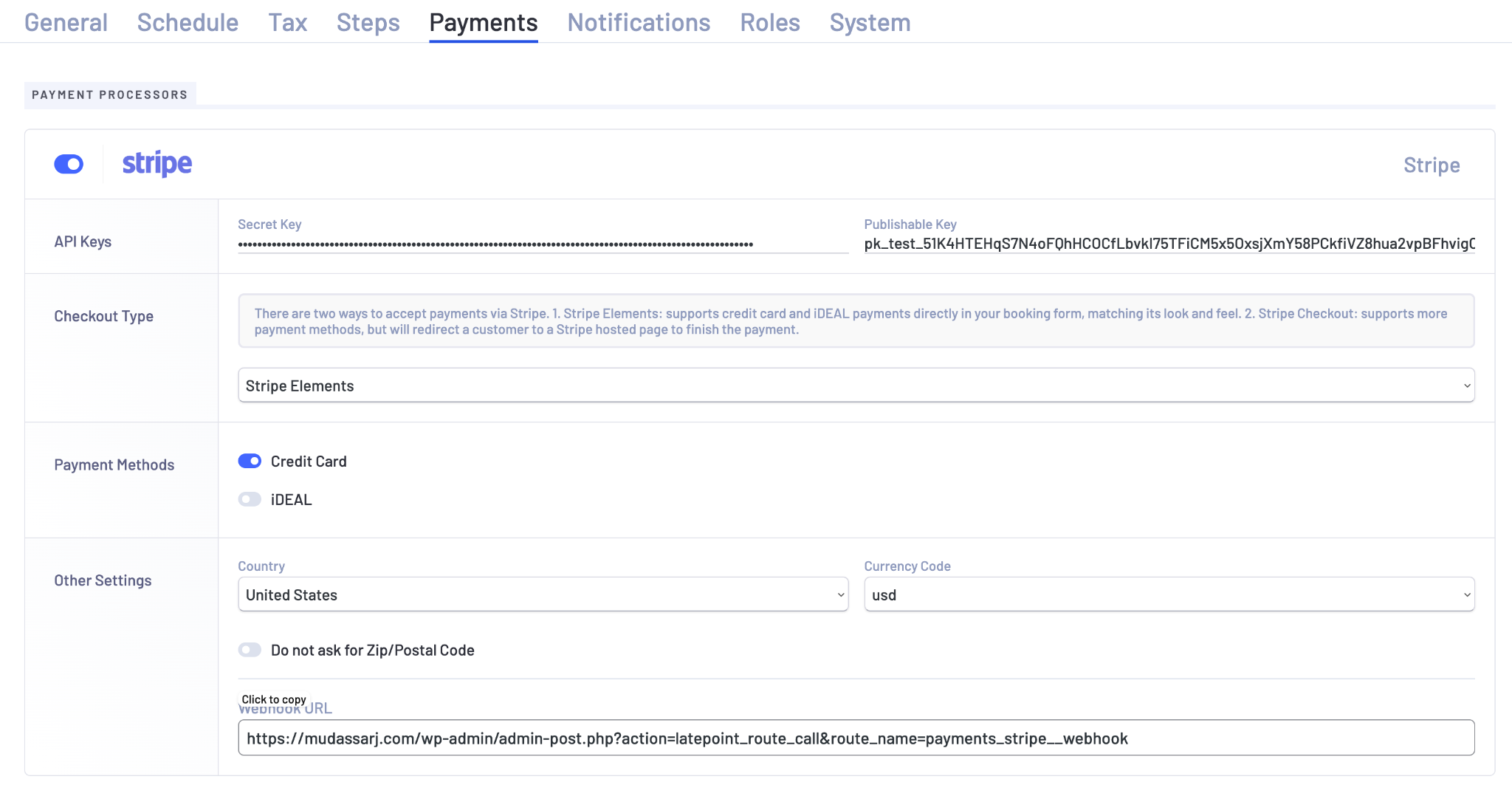
We opted for Stripe for our test site.
What truly impressed us was that, unlike other booking solutions that require an additional Stripe account creation, LatePoint seamlessly integrates with your existing account for payments.
It’s swift, seamless and simple!
Testing Mode
We recommend testing your booking and payment systems before launching your live site.
To enter testing mode, you need to navigate to the payment page and scroll down to locate Payment Settings.
Select the Testing (Development) option from the Environment field to activate testing mode.
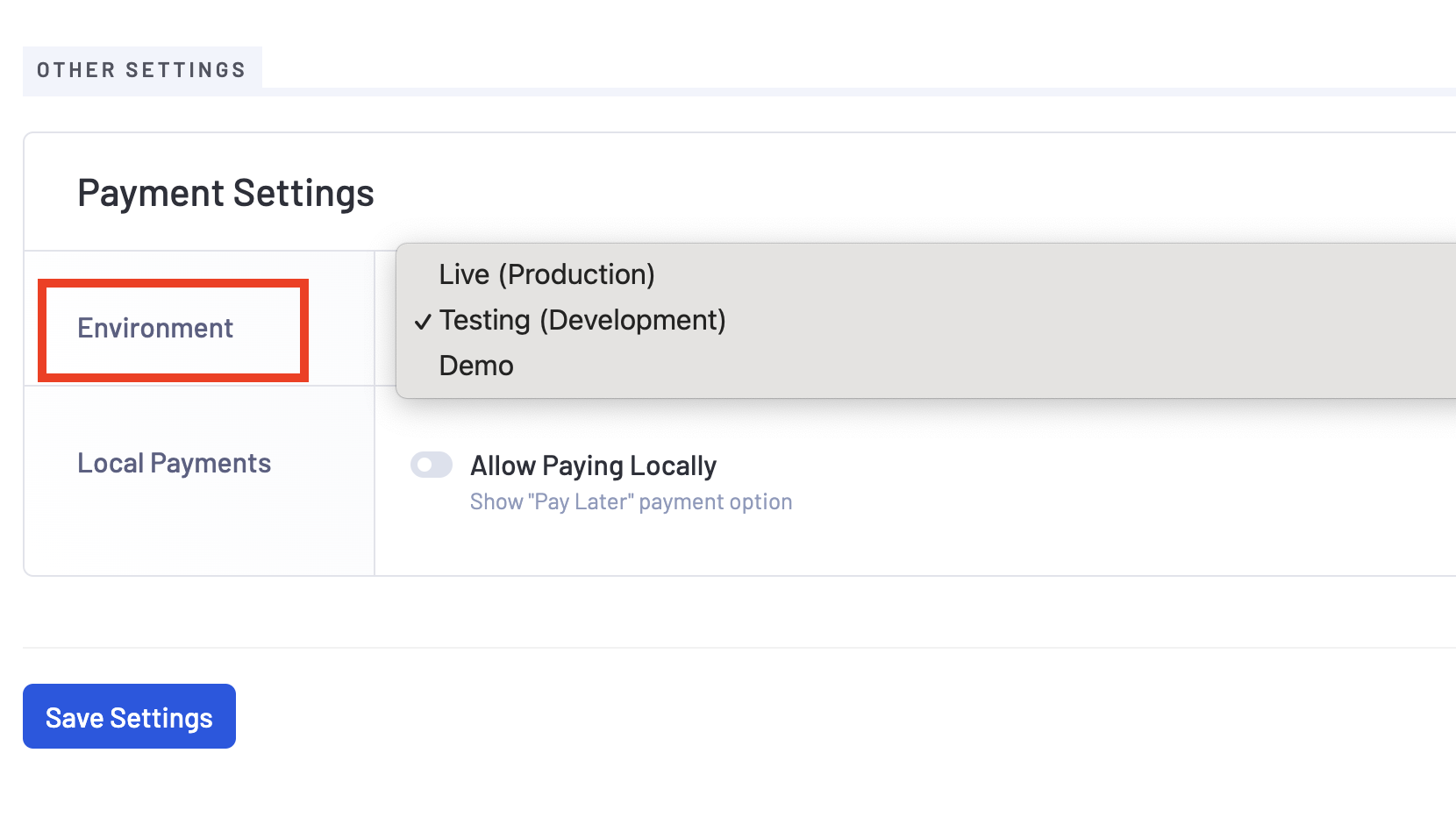 Once completed, you have the flexibility to switch the value to Live (Production) or Demo as needed.
Once completed, you have the flexibility to switch the value to Live (Production) or Demo as needed.
Services
If you have a business that offers a wide range of services, the Services module has got you covered.
It has all the tools you need to craft, categorize, and manage services in the simplest way possible.
You can create optional bundles for your customers by connecting addons with your primary services.
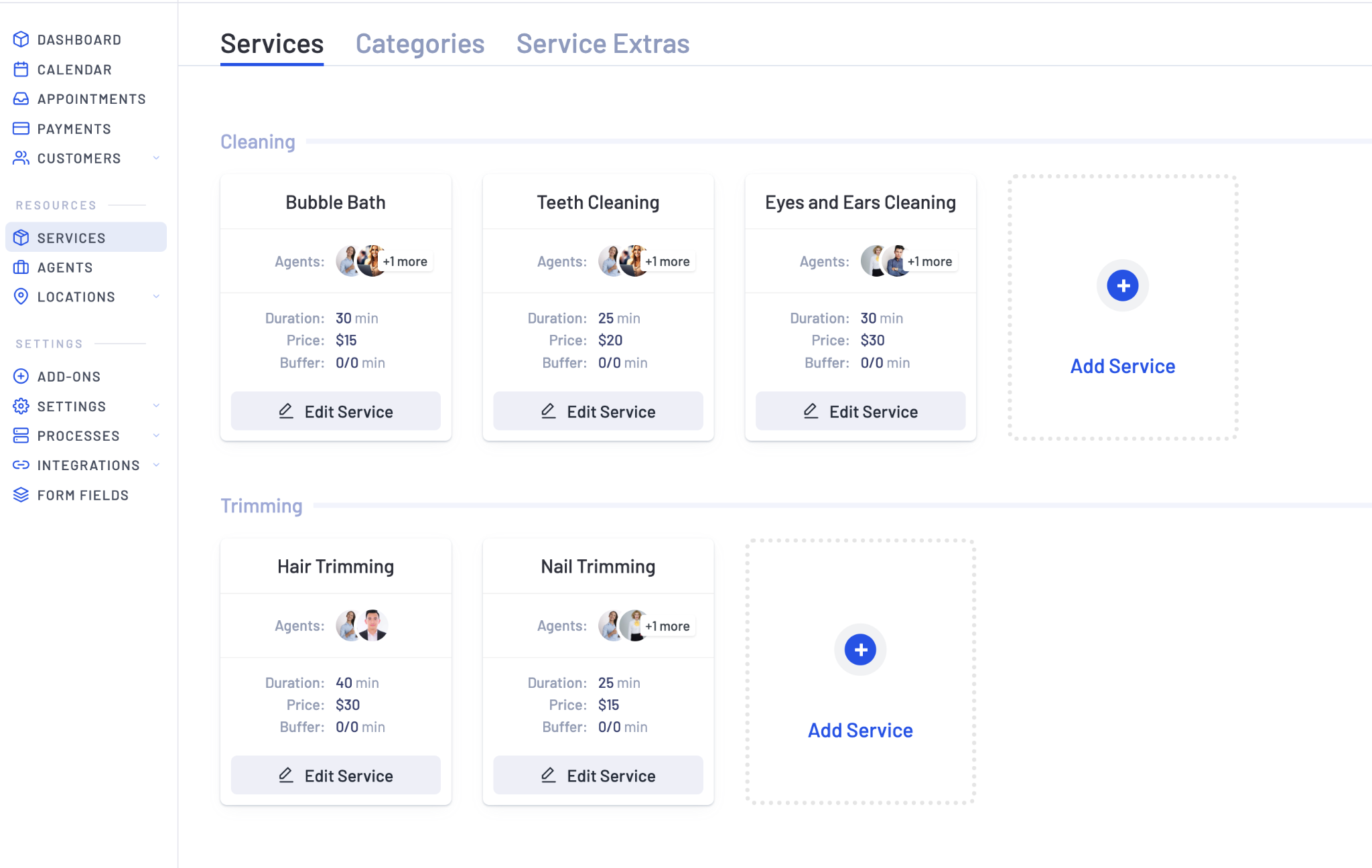
The process of setting up a service is straightforward, but let’s take a closer look at some of the standout options within the Services module.
When you click the Add Service button, a page opens with relevant options. This is where you will find important information such as the service name, its default status, the color scheme, as well as an image of the service.
Scrolling down reveals the Service Duration and Price widget. This segment is remarkably versatile, allowing you to add multiple sub-services with distinct prices and durations.
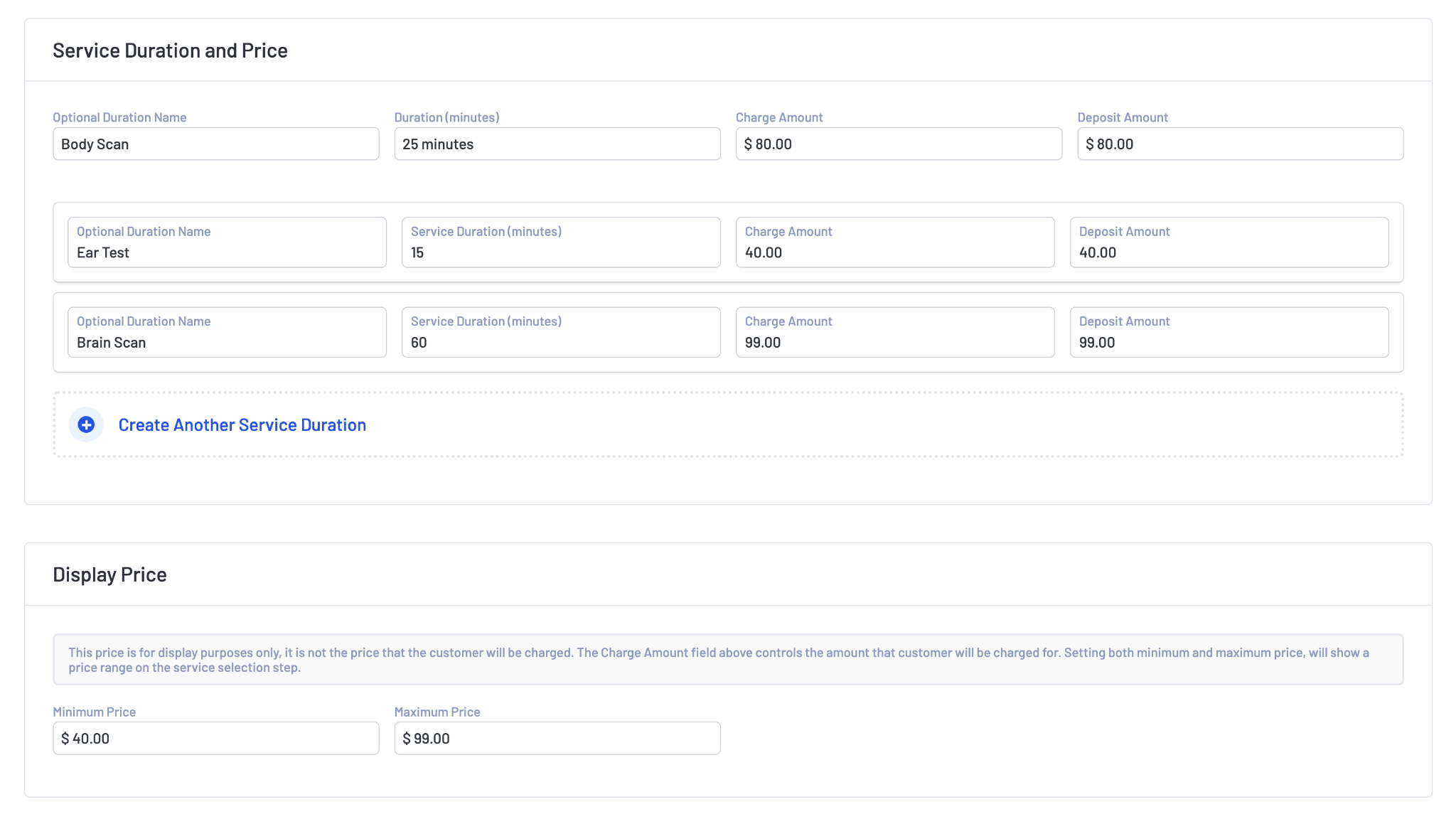
The Display Price widget allows you to entice customers by showing a minimum price that is applicable to one of the sub-services within the primary service.
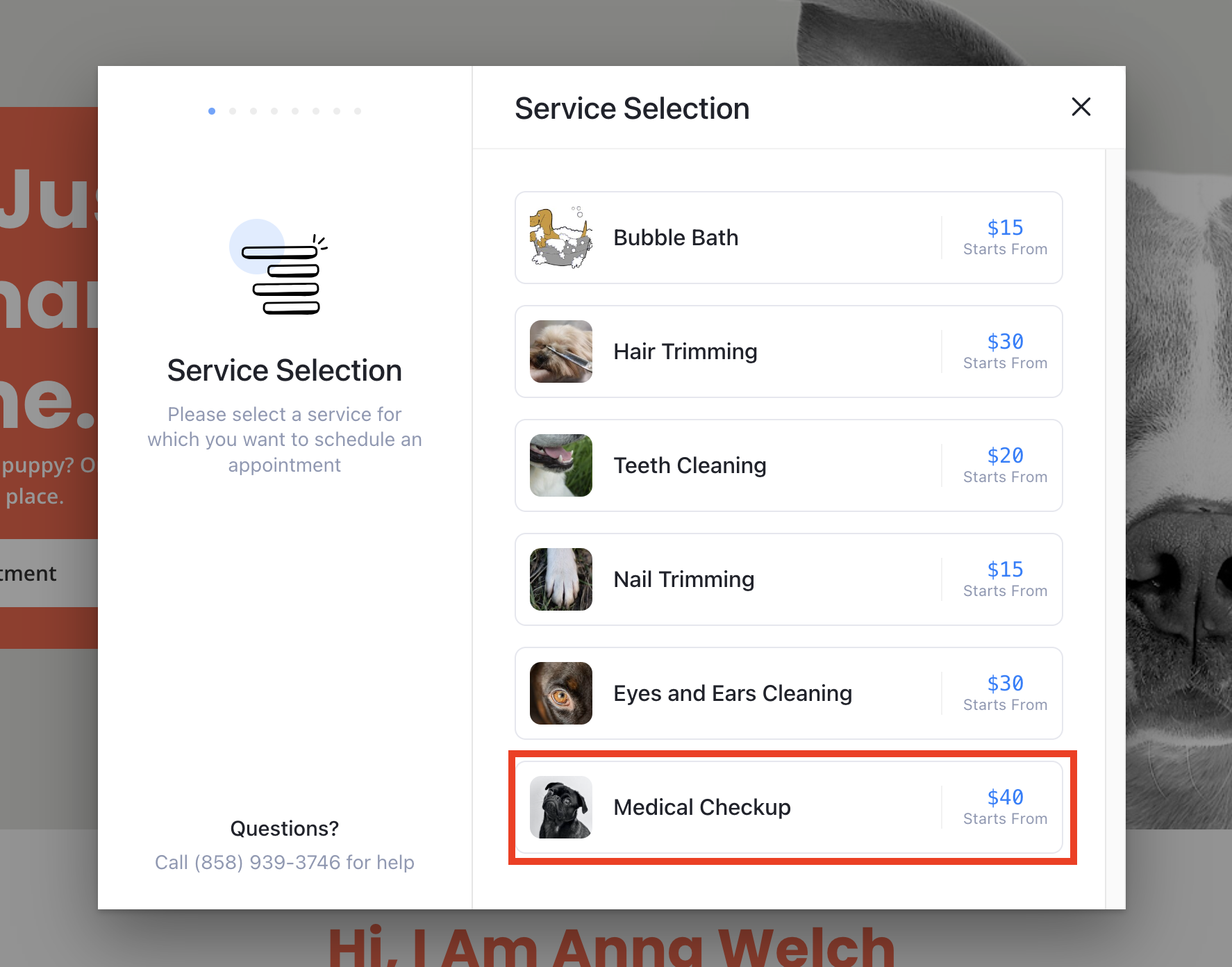
If you click on a service, you will see the available sub-services that you can select from.
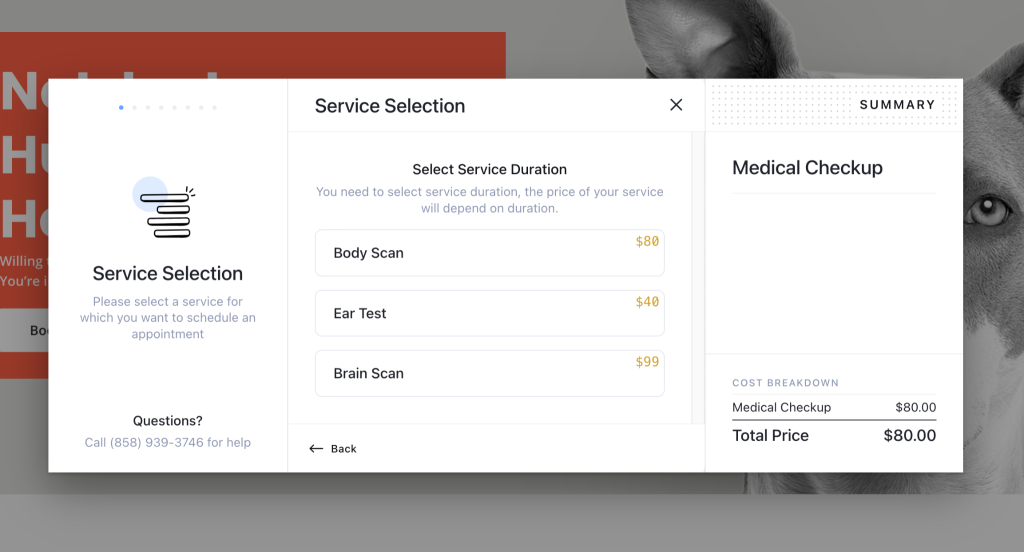
In our test, we displayed the ear test price ($40) alongside our primary service on the booking form so customers would click through.
We commend LatePoint for granting the option to override the default schedule for any service right on the same page.
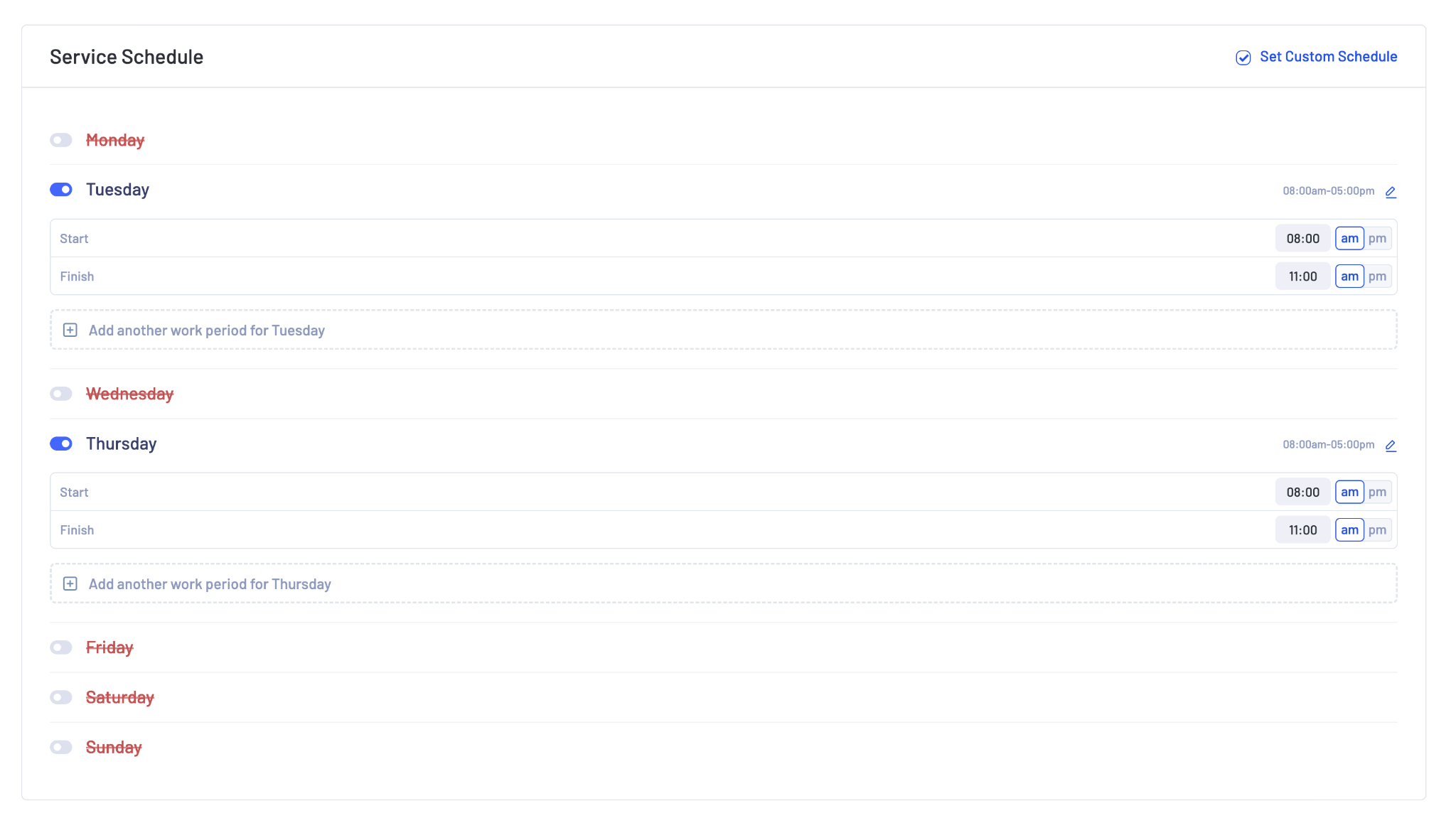
For instance, we allocated Tuesday and Thursday mornings specifically for medical checkups.
On this page, you will also be able to assign a specialized agent (like a doctor) to handle certain services, or assign a different status to the default value if you need to adjust it.
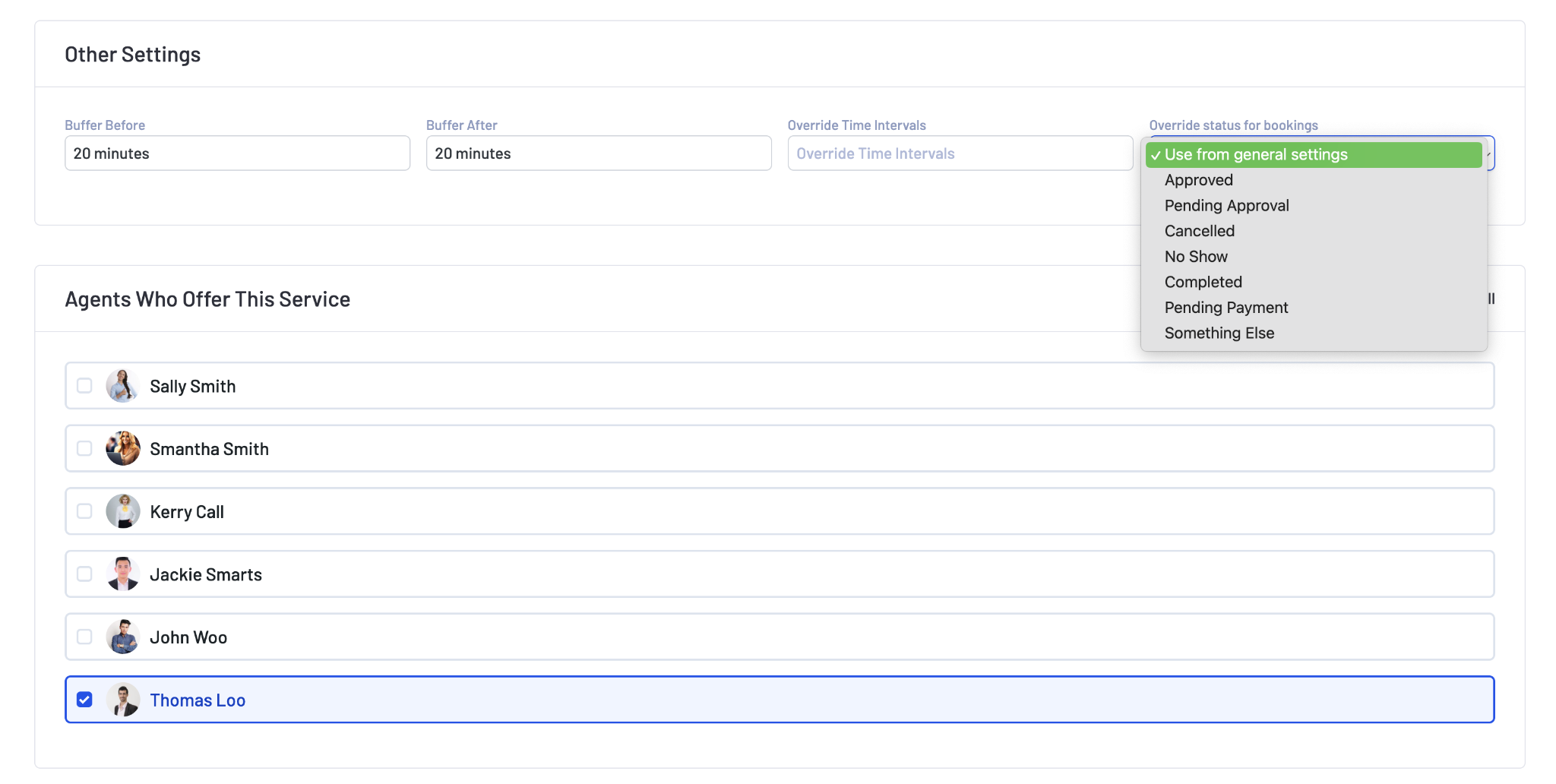
Overall, the Services module stands as a powerful tool adaptable to your business needs in various ways.
Calendar
It is possible to use Google Calendar with LatePoint to gain a significant advantage as this is an easy way to manage appointments.
As of now, you can only integrate Google Calendar into your calendar, but plans are underway to integrate Apple Calendar and other platforms in the near future.
To integrate Google Calendar, access the Integrations page within the Settings menu.
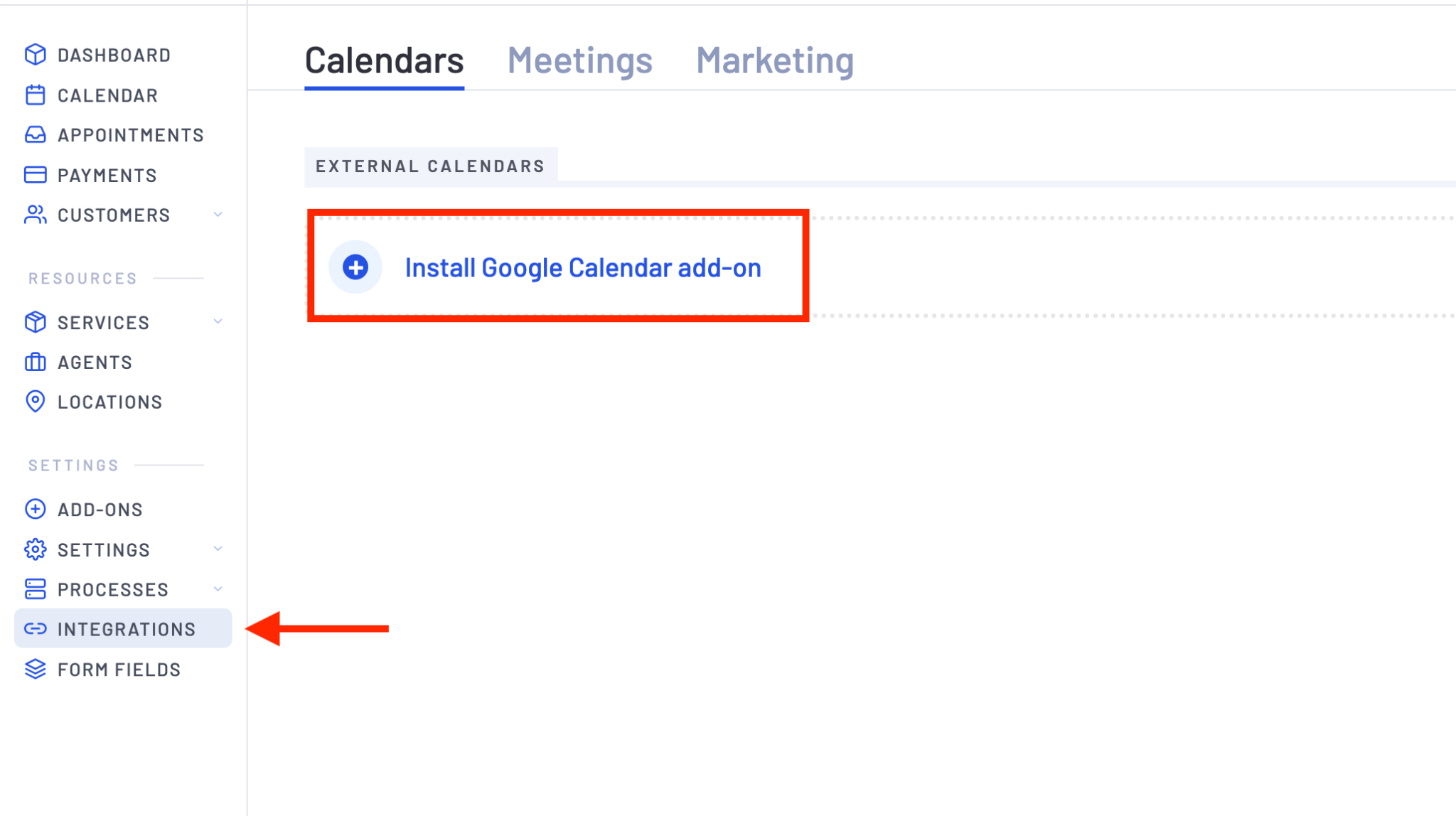
Like all of the other segments, you can choose from different views within the calendar as well.
For example, show a day view or choose from a weekly or monthly calendar. You can do this by using the filter positioned in the top right corner.
This handy feature is useful, particularly when you are managing multiple agents.
How To Integrate Google Calendar
The process of integrating Google Calendar may require some technical work on your part. You will first need to access the Google console in order to obtain the required IDs.
The developers intend to optimize this process into a streamlined, one-click operation in future updates.
If you are looking for more information on integrating Google Calendar with LatePoint, you should refer to their knowledge base. You’ll find a tutorial to guide you through the steps for integrating Google Calendar and exploring the features of the calendar in greater detail.
Other Important Settings
In order to make sure we covered all bases, we thoroughly tested LatePoint.
Here is a list of features that will truly make this a valuable option.
Notifications | Enable and personalize email, SMS and chat notifications. |
|---|---|
Roles | Create custom roles to allow or restrict agents from accessing LatePoint features. |
Processes | Create and personalize conditional processes to notify agents and customers about activities. |
Integrations | Manage the integration of multiple addons such as Google Calendar, Google Meet, Zoom and others. |
Form Fields | Customize form fields. You can also add custom fields depending on your needs. |
Locations | The module helps manage locations and how agents should be linked to them. |
What’s Coming Soon
As we mentioned before, there’s plenty to look forward to in the upcoming versions of LatePoint.
Here’s a glimpse of what’s on the horizon:
- Integration with SureTriggers, SureCart, and Spectra
- Capability for recurring payments
- Apple Calendar integration
- Bulk session buying for cost savings (great for customers needing sessions weekly or monthly)
- Extensive design customization options
- Flexibility to rename “Agents” to something like “Groomers”
- Plus, a range of other advanced features to enhance the experience!
LatePoint: Final Thoughts
So that’s it for my LatePoint review!
After diving deep into LatePoint, it’s crystal clear: this plugin holds its ground for all kinds of businesses that rely on bookings.
From its smooth setup to a wide range of customization tools, LatePoint stands out as a game-changer.
Now I want you to tell me what you liked about it. What do you think they need to improve? Let me know by leaving a comment below.
Disclosure: This blog may contain affiliate links. If you make a purchase through one of these links, we may receive a small commission. Read disclosure. Rest assured that we only recommend products that we have personally used and believe will add value to our readers. Thanks for your support!


